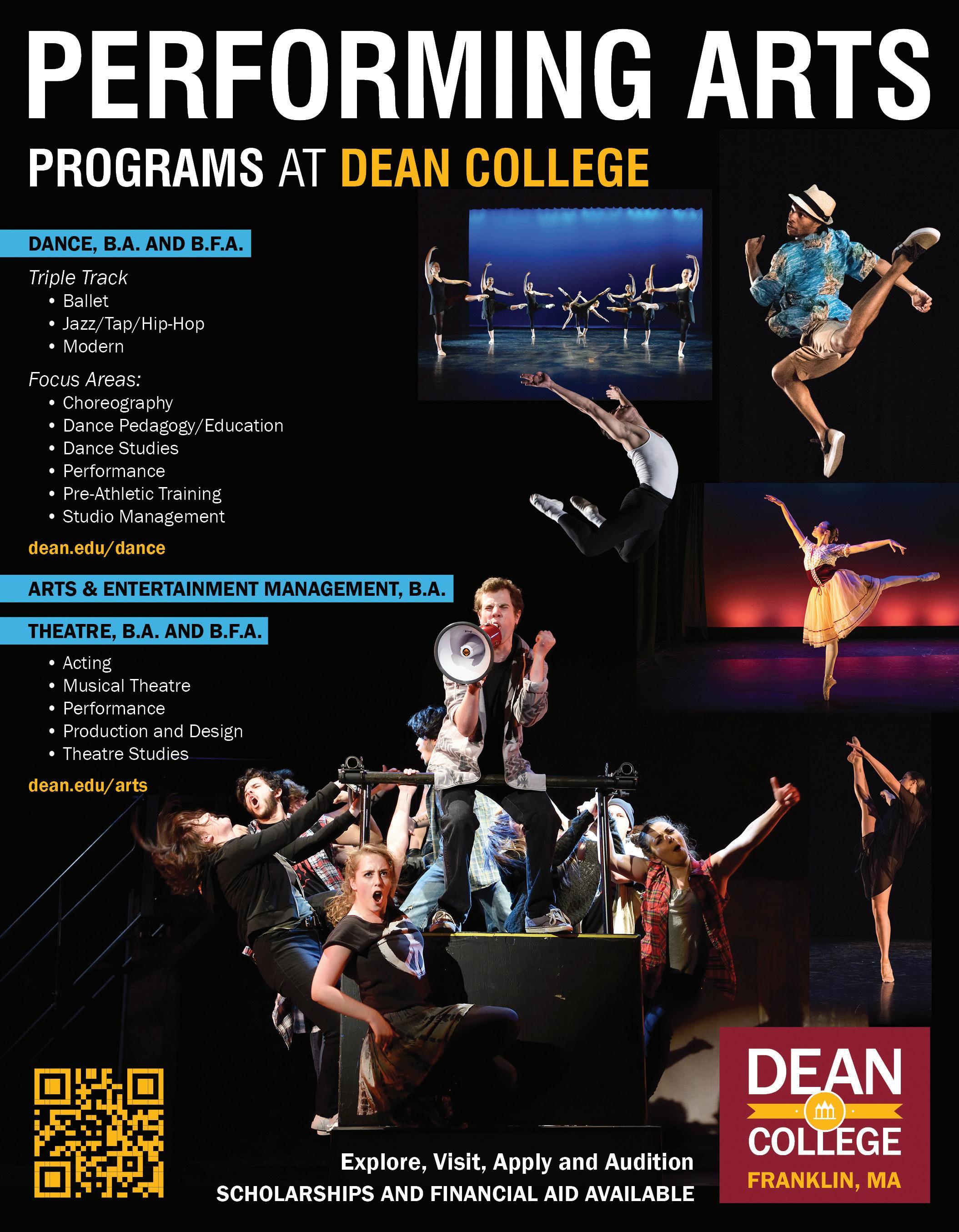PERFORMING & VISUAL ARTS COLLEGES
HOW TO FIND A PAID ART INTERNSHIP TIPS ON CAREERS, AUDITIONS, AND SCHOLARSHIPS!
PLUS:
CHECK OUT OUR COVER CONTEST WINNER


mschwartz@teenlife. com.


HOW TO FIND A PAID ART INTERNSHIP TIPS ON CAREERS, AUDITIONS, AND SCHOLARSHIPS!
PLUS:
CHECK OUT OUR COVER CONTEST WINNER


mschwartz@teenlife. com.


or centuries, each generation makes their mark in the world. Sadly, seminal moments in art, science, or literature are only recognized in retrospect. But there is endless potential for the next generation to create that seminal moment in their field. Every year, a new group of future artists, performers, and dreamers are looking to take their skills and talents to the next level.
It is the responsibility of the previous generations to mark the path ahead, offer insight, and to minimize obstacles on the road to success. In TeenLife’s 2023 Guide to Performing
& Visual Arts Colleges, we hope to do exactly that. This guide contains student testimonials, helpful articles, and important resources on scholarships and internships.
Our dream is for your light to shine brightly and for your passion to come through whatever medium you use to express it. Let us help.
Marie Schwartz CEO and Founder, TeenLife Media
Learn more at saic.edu/ug
We are interdisciplinary.
In the School of the Art Institute of Chicago’s undergraduate program, you won’t choose a major and are free to explore and create across our 17 studio and academic departments. We’ll teach you a way of thinking not bound to one medium, so you can customize your education and choose from a range of media to fulfill your artistic vision.

Imagine yourself as part of our creative, innovative community of artists and scholars. Our programs span the disciplines of art, design, film and media arts, drama, music, and communication and rhetorical studies. Add the benefits of career advising, alumni mentorship, and study abroad opportunities, and it’s easy to see why the College of Visual and Performing Arts is the right choice for you.
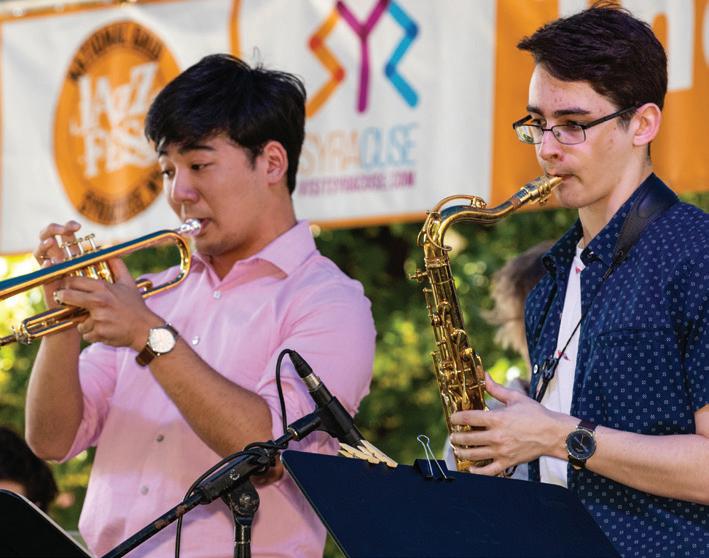
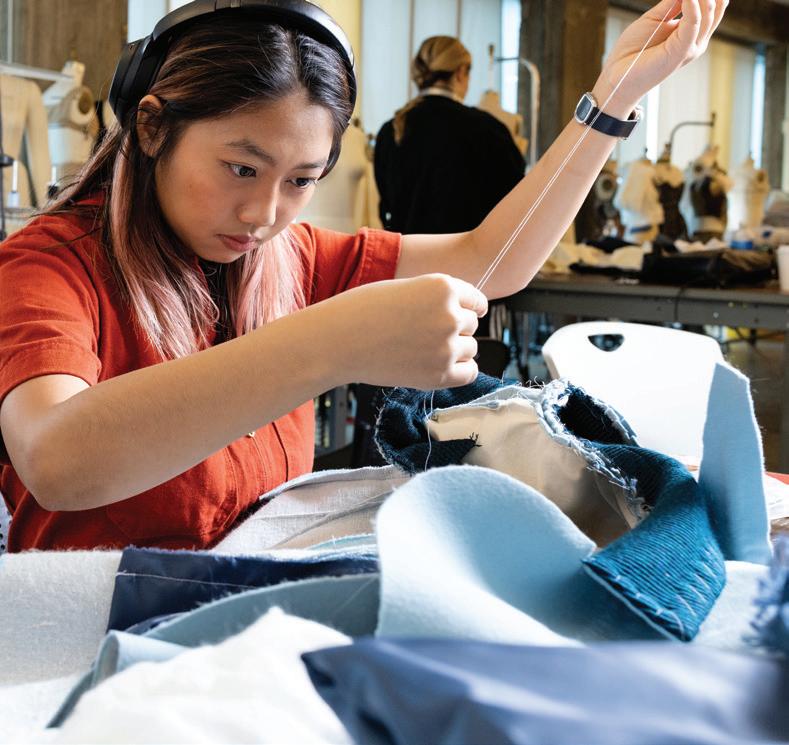


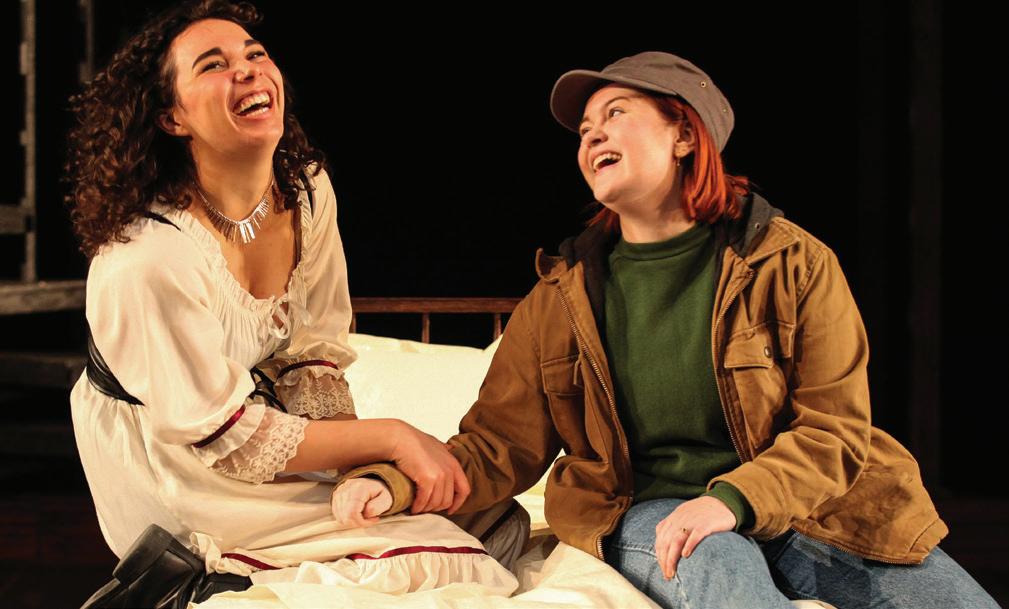
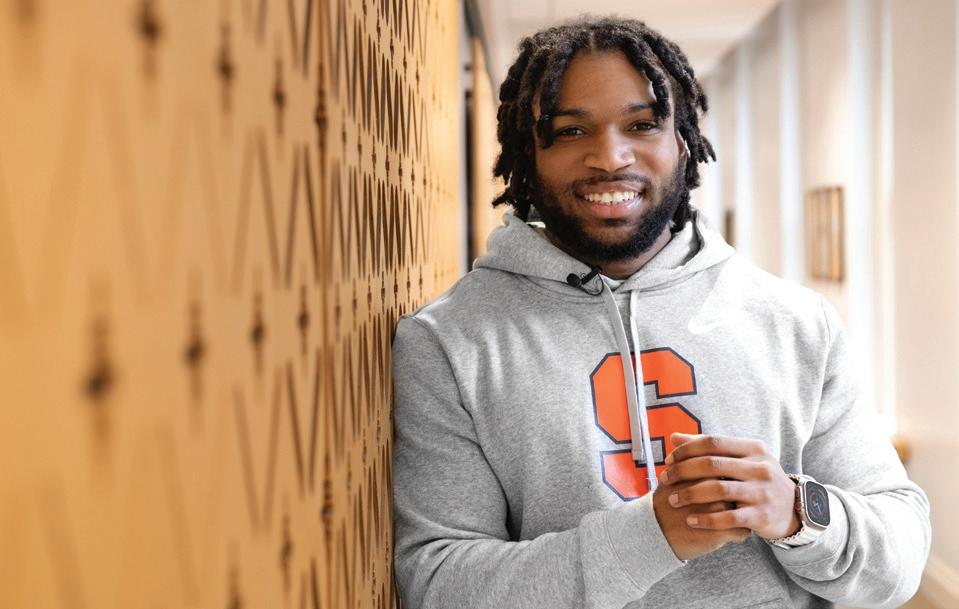
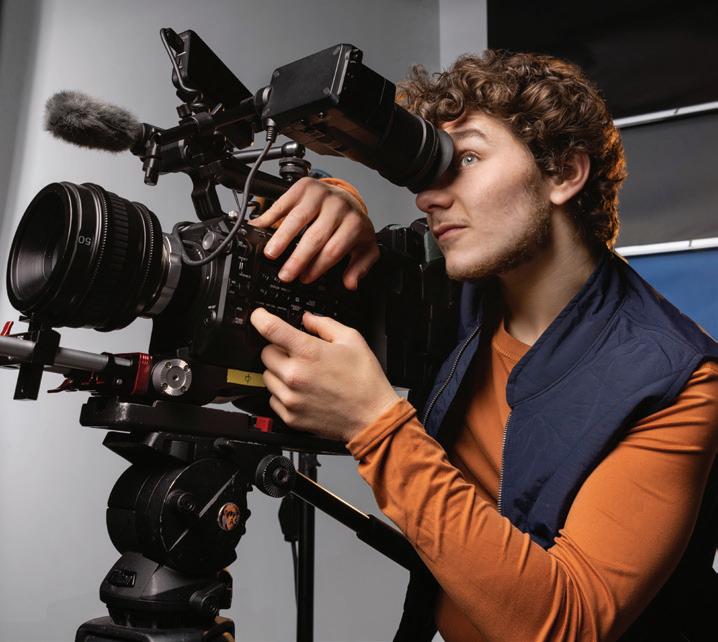

CEO & FOUNDER
Marie Schwartz, mschwartz@teenlife.com
EDITORS
Managing Editor - Janice Haller, janice@teenlife.com
Associate Editor - Nancy Li, nancy@teenlife.com
Associate Editor - Regan Beiermann, regan@teenlife.com
ADVERTISING
SALES
Senior Sales Account Manager - Brenda Boos, brenda@teenlife.com
Sales Account Manager - Jen Fisher, jen@teenlife.com
DISTRIBUTION
Digital Marketing Strategist - Dustin Silvaer, dustin@teenlife.com
DESIGNER
Kathy Tilton, kbtilton@gmail.com
To download a copy of this guide, go to: www.teenlife.com/guide-to-performing-visual-arts-colleges/
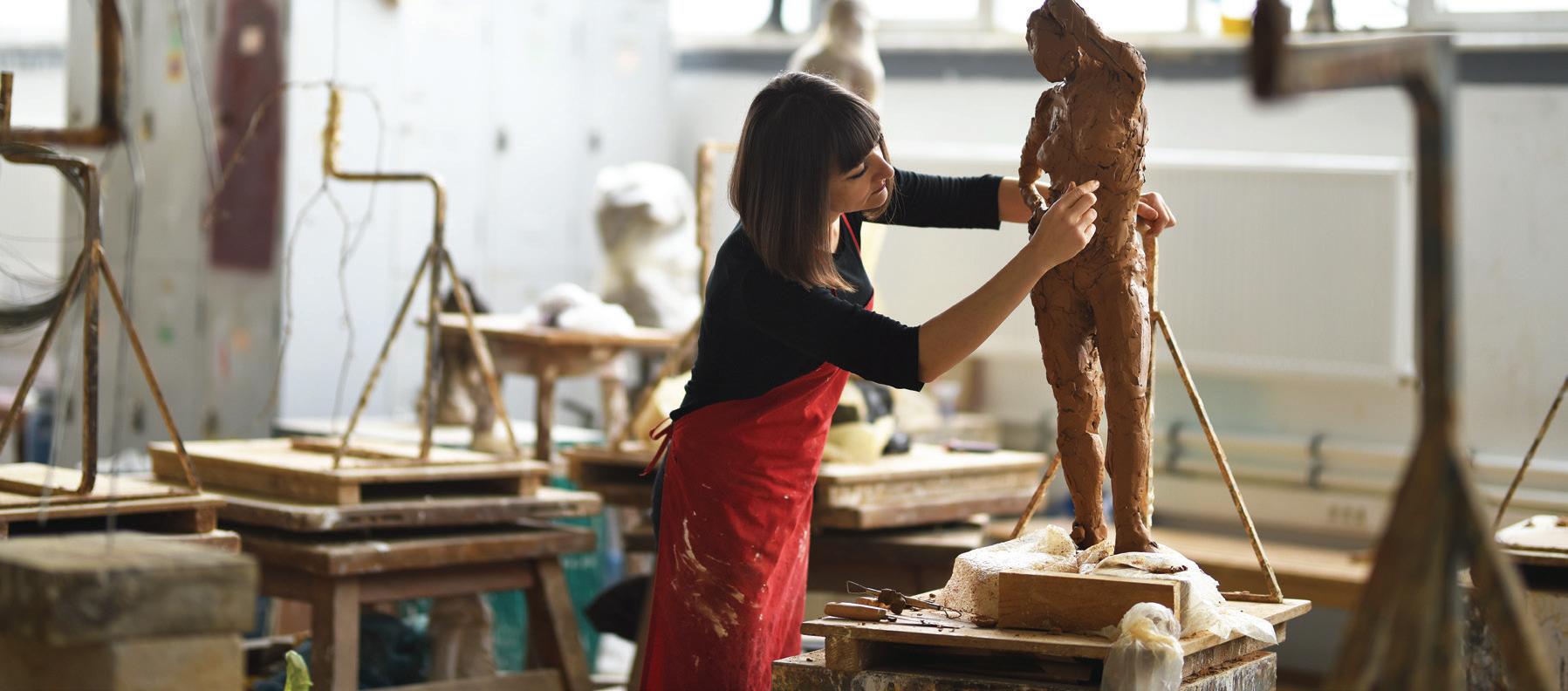
I had a calling to come to the University of Arizona. I can’t tell you what it was ... maybe it was the strong emphasis of curiosity and community from the university, my breakfast, or the proud representation of the Latino culture in Tucson that made me feel at home. But when I stepped onto the university’s campus, I had this warm, flooding feeling go through my body that started in my chest, and a voice in my head that said, “Here. You will find yourself here. You have to come here.” Everything else fell into place. I fell in love with the city and the campus by how it could feel just large enough for you to explore and find new people and opportunities, but just small enough for you to feel connected to the community, people, and the location.
I came into my first year being an engineering student, but it was only a matter of time before I became serious with myself and took a leap to follow my passion and dream of being an artist.
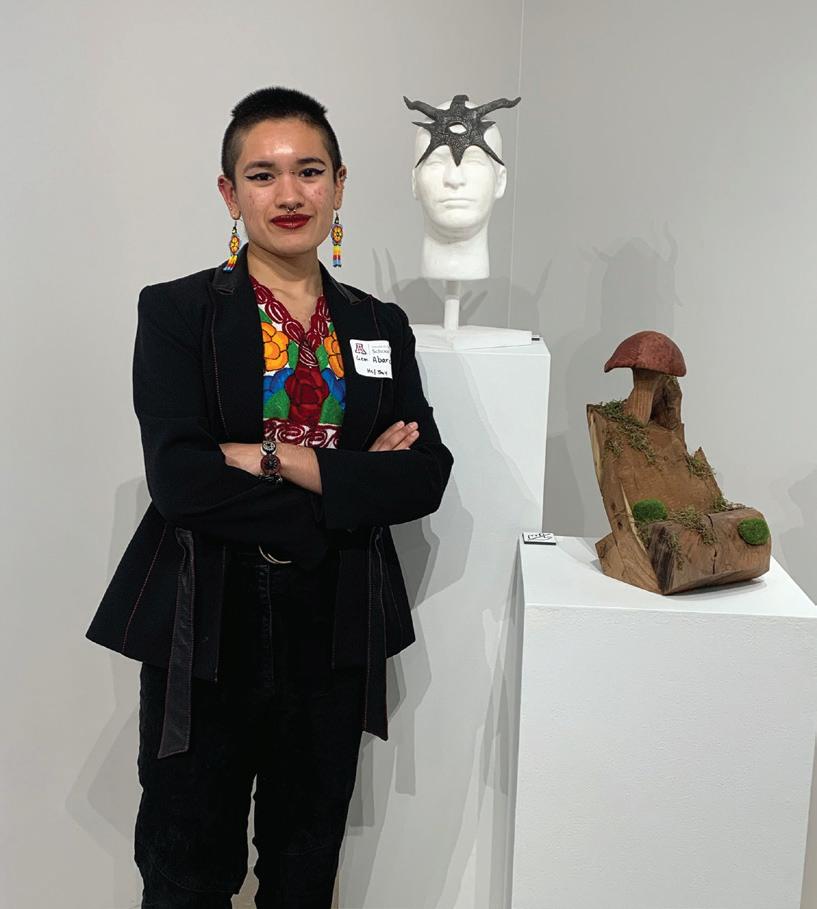
I didn’t know what art school was going to be like when I first began my program, so I didn’t have much of an end goal besides becoming a professional artist. Now in my fourth year as a student, I understand what this question means. I hoped to get and have earned critical mentorship. Art school teaches you how to make art, but mentors will teach you how to write, speak, give you tips on perfecting your craft, show you new artists, etc. They will show you what you will need to do to sustain yourself. Talk to all of your professors and keep talking. Get to know the ones that you feel the most connected to and they will help you learn most.
I’m not sure. In many ways, I dived head-first into the art program. I didn’t know what to expect, but I knew that I wanted to be an artist. So, I gave my classes my all by embracing the prompts given for projects and finding ways to challenge myself by using new material, finding non-traditional ways to accom plish a goal, or twisting the prompt. In another way, I prepared for this program by cooking under the pressure of needing to be myself. I have always wanted to be an artist since I was a child, but the world makes you think that it is impossible and that you should get a degree in something that will earn you money even if you hate it, because at least you have money.

My entire first-year experience consisted of me daydream ing about art, staying up making art, and searching for art internships when we were supposed to look up engineering internships. Looking back, I should have gone straight into art right out of high school. However, being in a space where I could not be my authentic self was the period of time I needed to become determined in what I truly wanted to do, who I wanted to be, and taking that leap.
Running. So much running around campus. Getting from my campus job at the Center for Digital Humanities located in the middle of campus to my studio classes at the edge of campus, spending the next six hours at the school of art with two back-to-back studio classes, finding a second to breathe between them … it’s so fun. Not to mention that often you’re running into friends as you’re doing all this run ning. And they’re running too! At the end of the day, you’re exhausted, but it’s a fulfilled exhaustion. You’re physically tired, but not emotionally. Always allot [space] for bad days and be kind to yourself on those days. Just because you’re following your heart doesn’t mean it’s going to be paradise.
University of Arizona College of Fine Arts




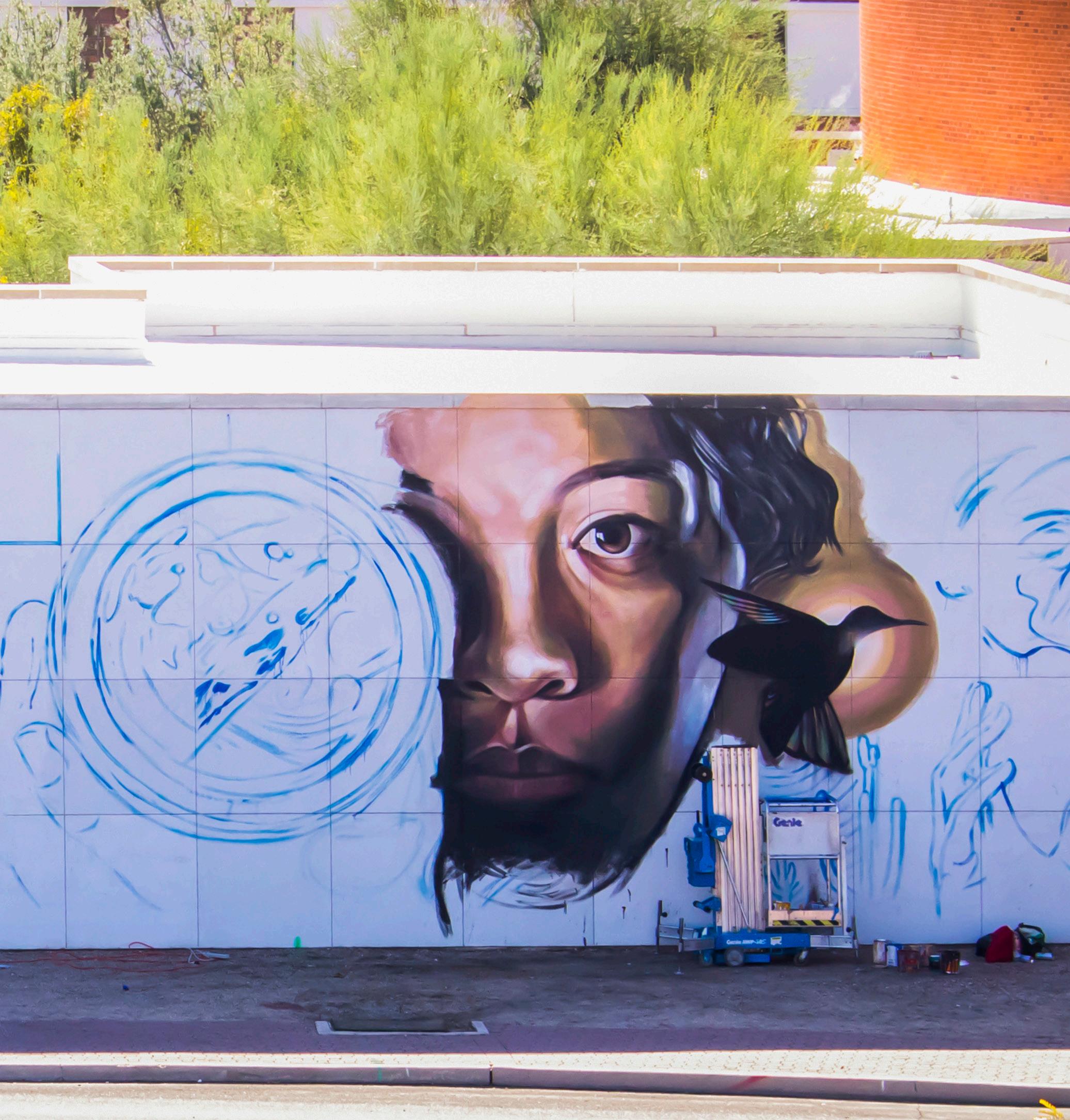

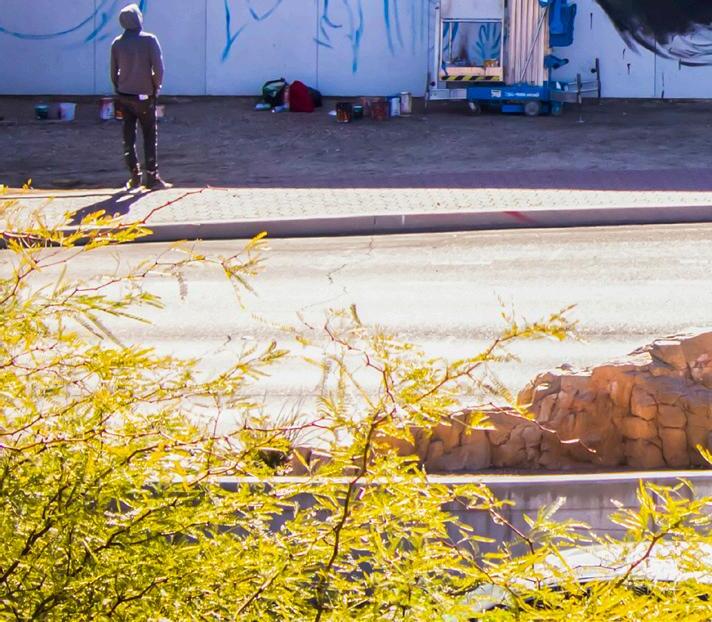


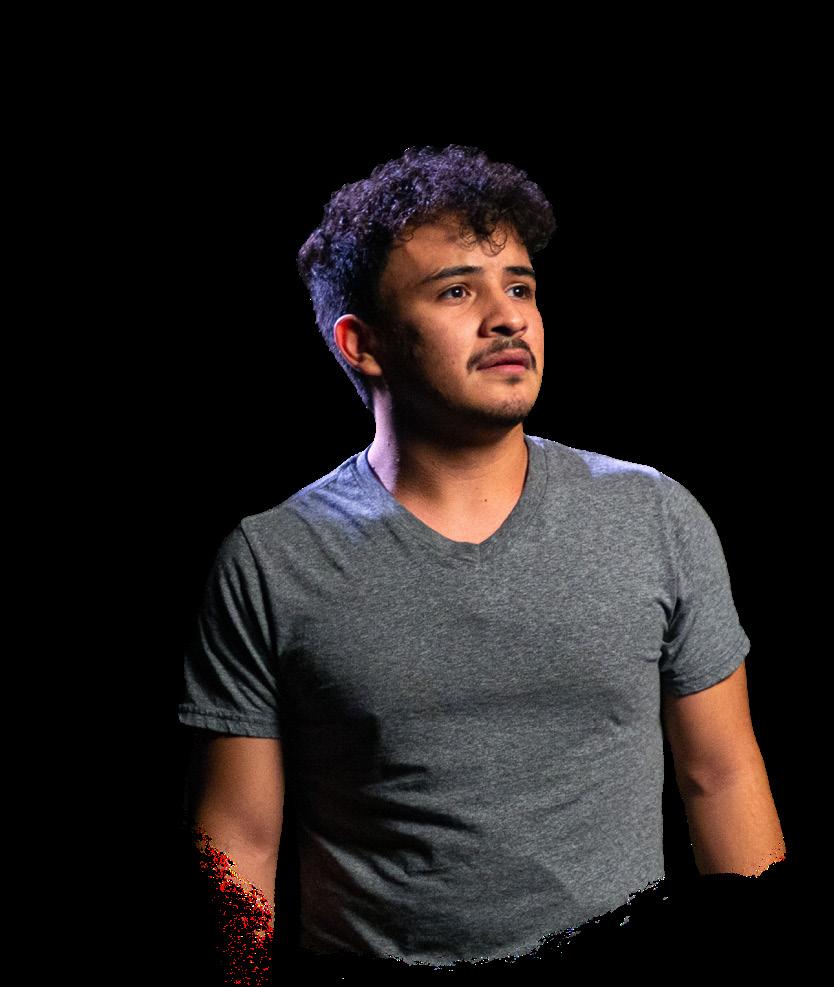
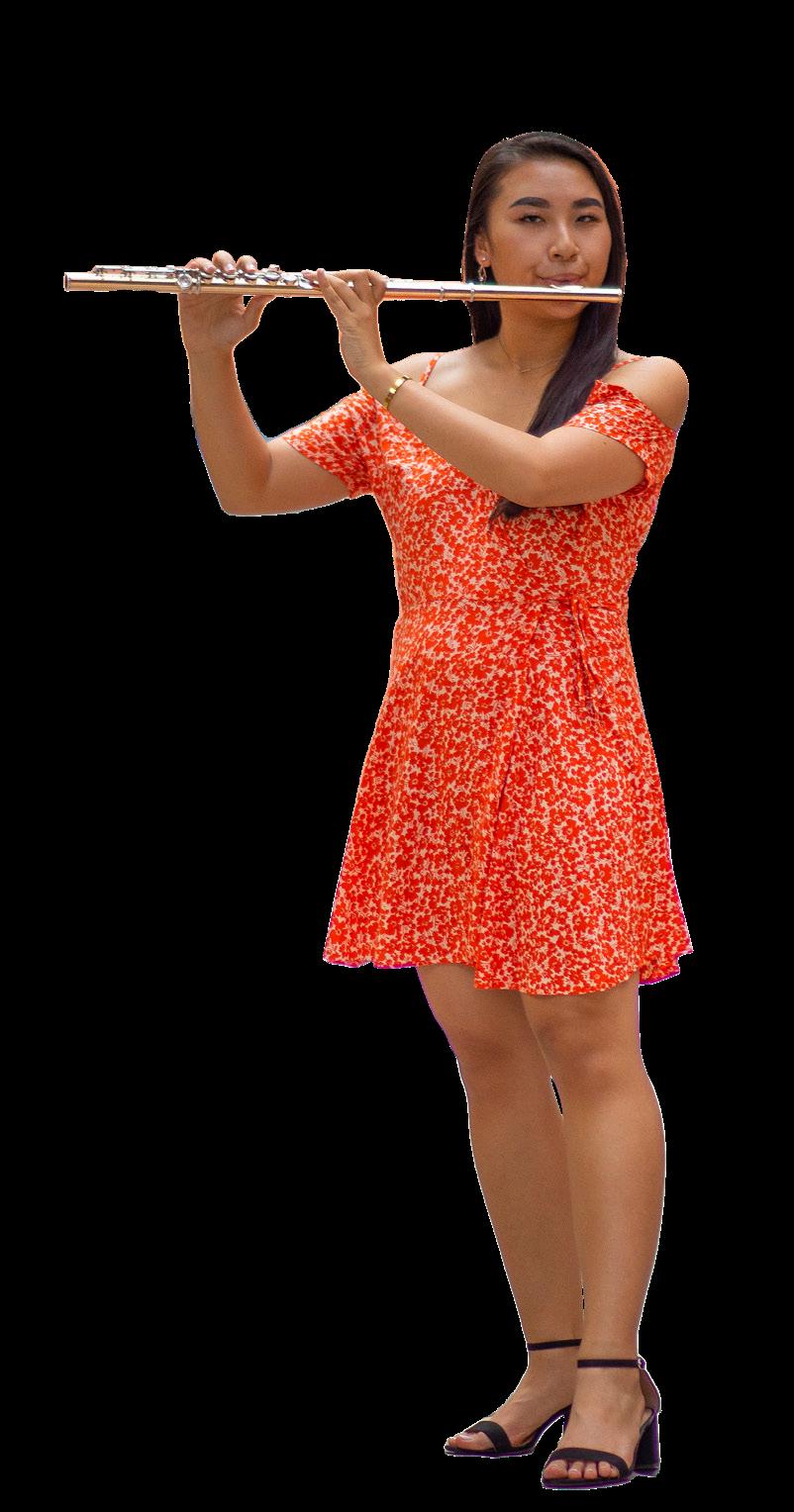



olleen Gutwein O’Neal is a photographer and curator from the Northeastern United States. O’Neal’s work is focused on the human experience through personal engagement, using photography as a way to build lasting relationships within her community. We caught up with her and asked her to answer a few questions about her career and find out what you can do with a photography degree.
I didn’t take a photography class until I got to college. Before college I saw photography only as one of many artistic mediums and opted instead to take my electives in painting and philosophy. I spent a lot of time in the summer between high school and college with a friend who was a photography major at Rowan, and this rekindled my interest in the medium. After that, I took an Introduction to Photography class my freshman year and once I was re-submerged in the
darkroom, I knew a photography degree was for me. However, I still explored other mediums as well as language, philosophy, math, and science to incorporate all of it into my work.
If you are a student and love photography, awesome! Keep loving it! Careers in photography are wide-ranging. If you are interested in the technical aspects of the craft, you could find work as a product photographer. If you love documentary style work and being around people and events, wedding photography could be a great opportunity to hone in on your craft or start your own business.
Alternatively, you can reject “making a product” and consider how photography is harnessed within the art world, create documentary content, or support non-profit groups or activist causes. There are so many opportunities within the field, but you must be willing to hustle.
Thinking about the future of photography is exciting! It’s such a young medium especially when we think of it on the same scale of painting, which has been an artistic expression created by humans tens of thousands of years ago.
I think photography can surprise us in the art world, and forever change the way we view each other and societies across the globe. As traditional photography jobs seem to be waning, the medium has been made accessible to huge portions of the population through camera phones, and we are able to share our experiences globally with social media.
What makes a photographer “good” is a loaded question. Is it something your parents or your teachers taught you? Is it something that you feel
when you look at an image? I believe we are coming into an age where traditional aesthetics are no longer held as the highest importance.
What you do with your work is more meaningful. A good photographer has nothing to do with the quality of images, Instead, it has to do with the intent of the work and the ethics of the photographer. We are not creating work in a vacuum; we have a great deal of responsibility every time we pick up our cameras.
I think that the future of art is determined by those who do the work, meaning artists, critics, and organizations that hold true to their missions and consistently create. Art allows us to see beyond ourselves and our own expectations, allowing us to reach further and enter worlds we have never even dreamed of. Through this, we're able to pull new ideas into our current state of being. •
Interdisciplinary Arts.
Core arts courses + your customized path.

With classes in: Art, Dance, Film, Game Design, Media, Music, And Theatre.


I chose to study BA (Hons) Music (Songwriting and Performance) at LIPA because the program was unlike anything I had seen in the United States and it seemed like a great place for someone to focus on and curate their art in a collaborative setting. Plus, I’ve always wanted to study abroad in England!

I wanted to do a lot of music collaboration and get more experience and knowledge in singing and the music industry. I have learned a lot about music and
the industry so far and have been able to collaborate with other songwriters, producers, and live bands! LIPA is a great place for working with other musicians and artists.
I was able to study music at Interlochen Arts Academy for the last two years of high school, and that definitely prepared me to be immersed in an artistic environment that requires a lot of focus and dedication to your craft. Also, as an international student, I did a lot of research into the city and school, to make sure I was all set when I got to Liverpool. The International Team supported me in answering questions and with visa guidance, which helped a lot.
A typical day at LIPA for me consists of a couple seminars about music or songwriting and the business side of things and a band rehearsal or two. I have a one-to-one voice lesson every week, and then usually time to practice or catch up on assignments. LIPA is a place that values and encourages you to focus on your individual career goals, so you can build your schedule outside of class time to fit your needs!
I would say doing my first live performance at LIPA with a full band. It’s so wonderful getting to meet and work with people from all over the world, and my first performance was so much fun because I was sharing the stage with my friends and getting to share the music we created together.
Go with your gut. I was indecisive about which college to choose for most of my senior year. I knew LIPA was the right choice for me because when I found out I had been accepted, I couldn’t stop smiling and thinking about the prospect of studying there. You will know when a school is going to be the right fit for you! And most of all, trust that you will make a good decision. You’ve made it this far, be proud of yourself for that.
The Liverpool Institute for Performing Arts (LIPA)







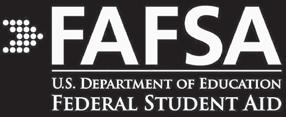



raduating from art school can lead to a number of non-traditional and highpaying careers, with salaries matching or exceeding that of other fields. Below, we’ll take a look at three such careers, each intended to give you a better idea of the many varied paths you can take out of art school.
Not all of these careers may be available to students immediately out of college - specific experience and training may still be needed - but all careers explored can be reached with a specialized 4 year degree from an arts school, with no additional schooling required.
Video game artists work on different aspects of video games design, from backgrounds to 2D environments to 3D models. Whether through modest pixel art or huge, three-dimensional environments, video game artists help bring digital worlds to life.
The exact responsibilities of a video game artist will vary depending on the size and style of the given project. For example, if a game artist is working for a big-budget, multi-million-dollar video game, they may only work on one aspect - like the textures of vehicles - for the entire project. »

On smaller projects at independent studios however, a single artist may have a much more broad range of responsibilities.
In addition to relevant coursework and experience, skills required for video game artist positions include a proficiency in visual storytelling, a cinematic eye for shading and light, and familiarity with the various software used in video game design. For game artists working on 3D models, a knowledge of anatomy and basic animation principles can also be also important.
According to Zip Recruiter, the national average salary for a videogame designer in the US is $112,513 /year, or about $54/hour.
A User Interface (UI) Designer is someone who helps create the graphical interface that a user interacts with on a website, app, or device. Almost everything you interact with online, from the search bar of the web browser to the app icons on your phone, look the way they do thanks to a UI designer.
Responsibilities of UI designers vary depending on the project, but they often involve closely
collaborating with other professionals like Marketing Specialists, UX (User Experience) Designers, and Project Managers. UI Designers also help create style guides, test graphics interfaces across different devices, and work on incremental, back-end changes.
Skills required for UI Designer positions include competency in graphic art and design, as well as basic proficiency for coding. Many universities in this guide offer programs that teach a combination of these skills. Additionally, since responsibilities can vary so much project to project, a demonstrated history of working well in a team and responding well to criticism is vital for these roles.
According to Zip Recuriter, the average annual salary for UI Designer is $106,351/year or about $51 /hour.

Concept artists take the ideas of writers and directors and visualize them through art and design. If you see it in a video game, animated film, or even a live-action movie, there’s a pretty good chance that a concept artist designed it first.
Responsibilities of a concept artist include being able to read and interpret artistic briefs, designing something that animators or other artists can easily work from and with, and visually storyboarding big ideas, plot points, and setpieces.
Skills needed for concept artist positions often overlap with those taught in a traditional art school education, and include proficiency in physical and digital art and the ability to work collaboratively.
According to Zip Recuriter, the average annual salary for a concept artist is $133,415/year, or about $64 /hour.
These three careers are just a few of the many high-paying careers available to a recently graduated art school student. In today’s world, a traditional four-year degree can lead to a wide world of non-traditional jobs. We hope you find the right one for you! •
York University School of the Arts, Media, Performance & Design (AMPD)
Top 100 Performing Arts University in the World
QS University World Rankings 2023
Performance Programs
Dance (BFA | BA)
Music (BFA | BA)

Theatre (BA | BFA)

Visual Art & Design Programs Design (BDes)
Visual Arts – Art History (BA)
Visual Arts – Studio (BFA)
Digital Arts Programs
Cinema & Media Arts – Media Arts (BFA)
Creative Technologies (BFA)
Digital Media (BA)
Integrative Arts (BFA)
New Program
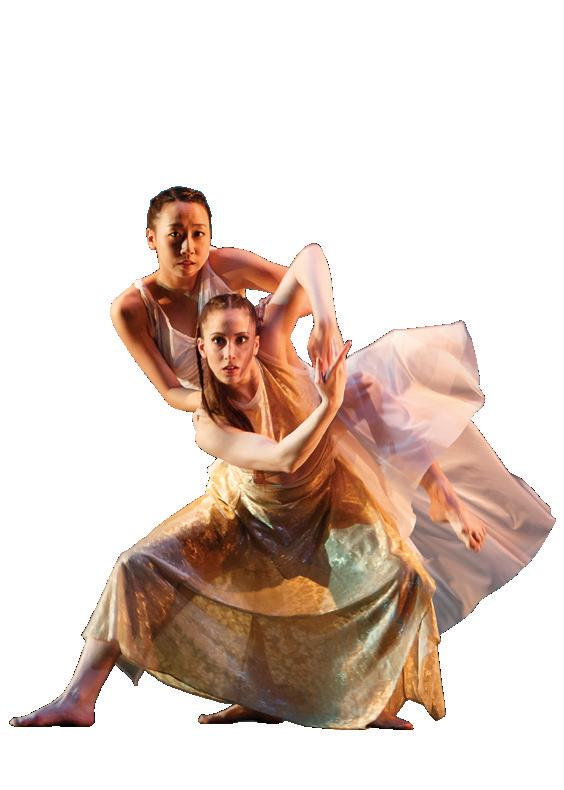
AMPD is one of the most comprehensive arts, culture, and design schools in Canada. Study in Toronto, Canada. Apply before February 1 to start in September 2024. ampd.yorku.ca
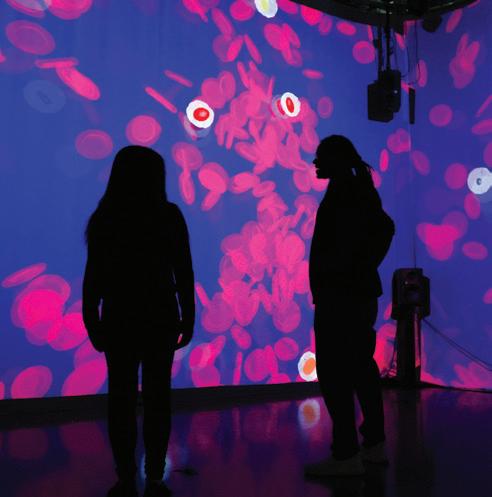
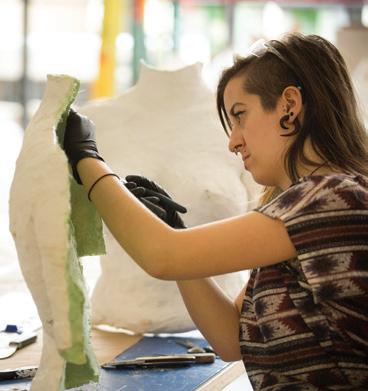
What led me to choose Principia was simple: After I visited the campus, I was able to picture myself as a student! Although I always knew theatre was the avenue I wanted to pursue in college, I have always made it my mission to become a well-rounded artist in the performing arts. For me, that meant educating myself in a variety of subjects beyond my major. Principia allowed me to do just that! Principia gave
me the freedom to not only pursue my initial passions, but to also explore other interests I had in Dance, English, History, Sociology, and so much more. This not only enriched my educational experience overall, but gave me depth as an artist. That really is the beauty of a liberal arts education!
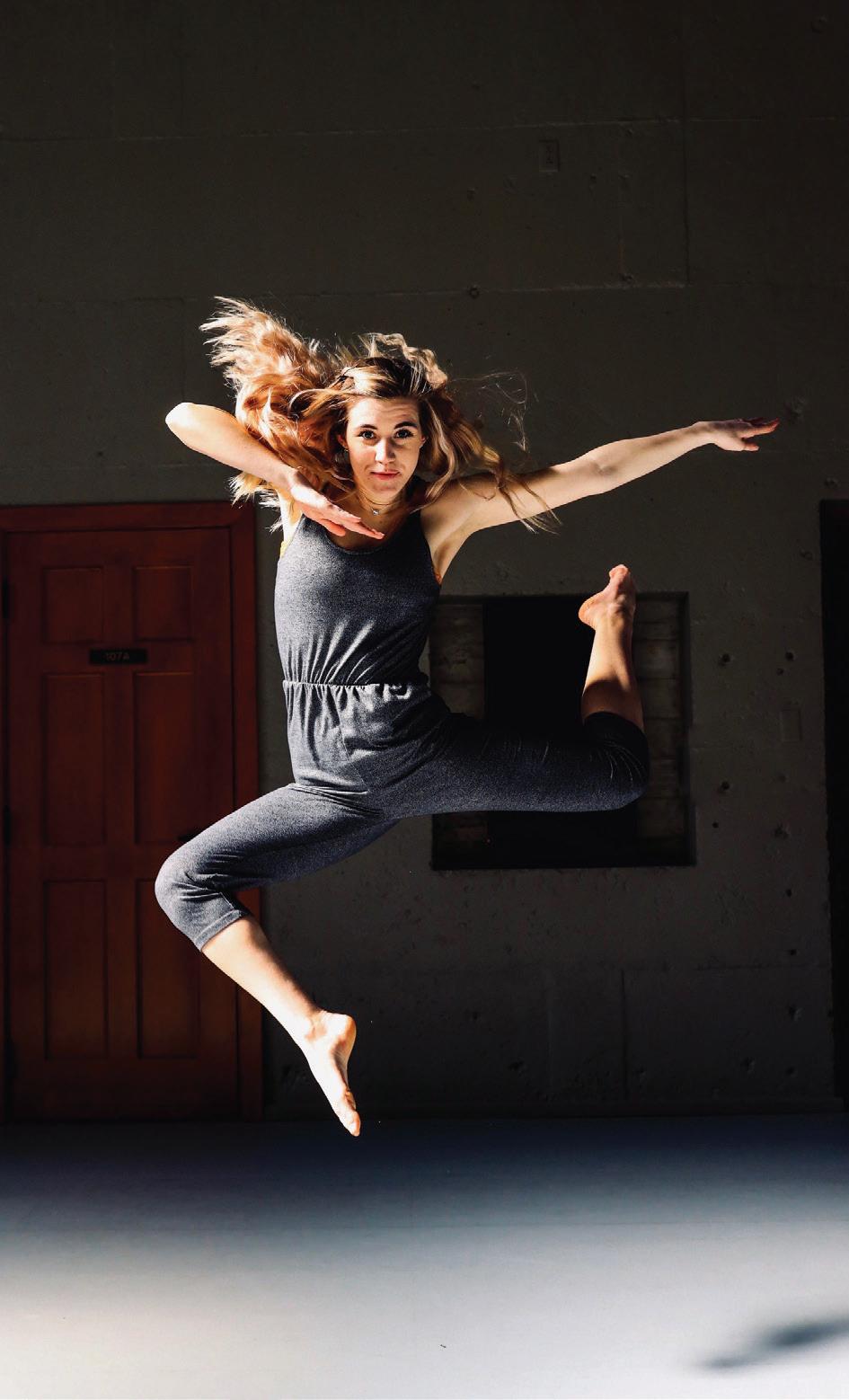
What I love about Principia’s theatre program, is that you have the opportunity to work with a small, close-knit group of artists each bringing their own talents to the table in a safe and nurturing environment that is at the same time, there to push you to go beyond what you believed you were capable of doing. I knew I wanted this intimate way of learning because I received real-time feedback from my professors, they were always accessible, and genuinely cared about my progress and individual goals as an artist and performer. Something also unique to Principia’s theatre and dance programs is that you begin right away! You not only start working on your craft in the classroom but you can start auditioning and participating in productions immediately.
Anytime I performed on stage was memorable for me. In particular, all of the dance productions I participated in were special because from the first to the last, I can go back and recall all of the progress I made in each one, as well as the loving cast members I got to share the stage with. I also had the opportunity to demonstrate many aspects of my creativity from choreographing, to light and costume design, all while getting to perform!
Would You Recommend Principia College to Others?
When you have the opportunity to visit a school you’re interested in, I think it’s most beneficial to really take the time - if possible - to sit in on classes and watch and listen to how the students and professors interact, and see if you can imagine yourself participating in the class too. Also, if you’re able to meet one-on-one with the professor of the major or major(s) you are potentially interested in, having that dialogue with them as well as getting a feel for their teaching style and their own insights on the program is incredibly helpful in navigating the college application process!
In sun-drenched studios or on state-of-the-art stages, Principia College visual and performing arts students bring their creative visions to life. Study and learn with working professionals in the U.S. and abroad, connect with a network of industry professionals, and show your work in acclaimed galleries.
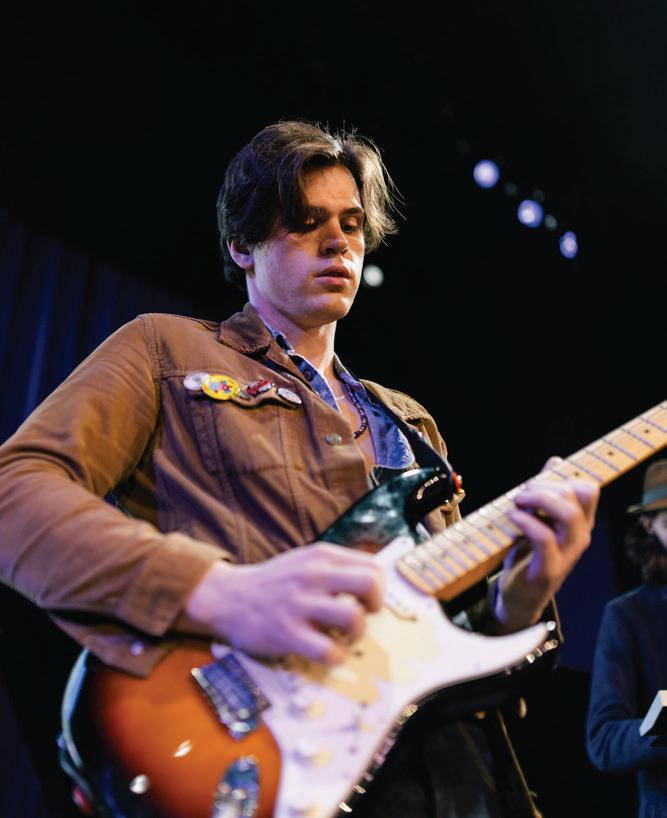
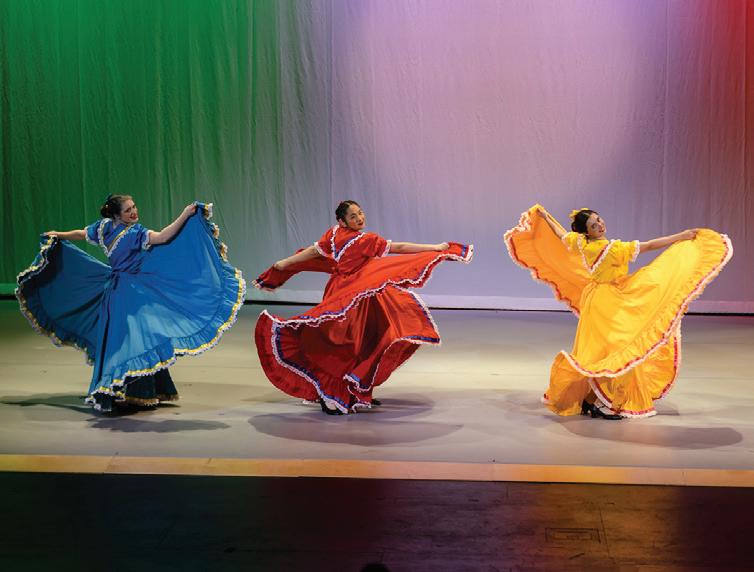
Get a B.A. in:
• Art
• Art History
• Theatre
• Music
• Music Studies
Principia alumni are on Broadway and in Hollywood, producing and showing work in galleries worldwide.
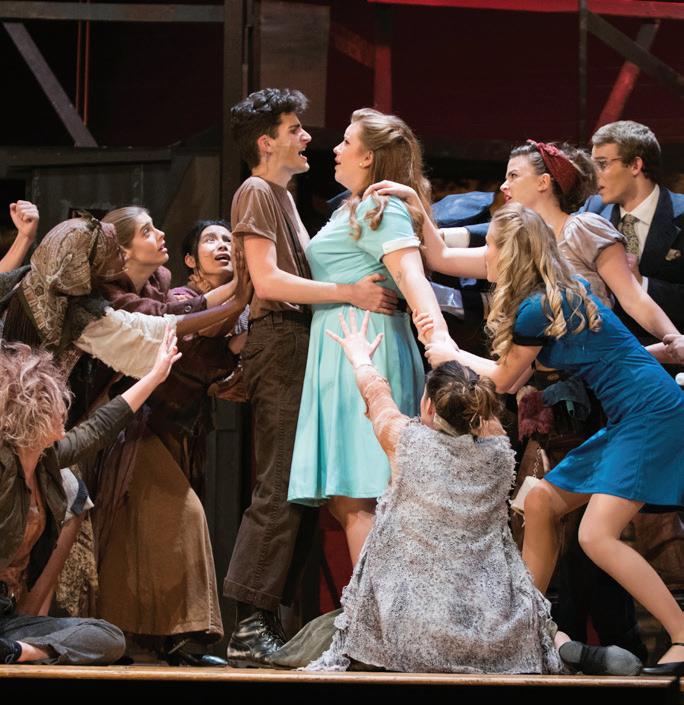
What can a Principia College degree do for you?

Unlock your creative potential at Principia College.
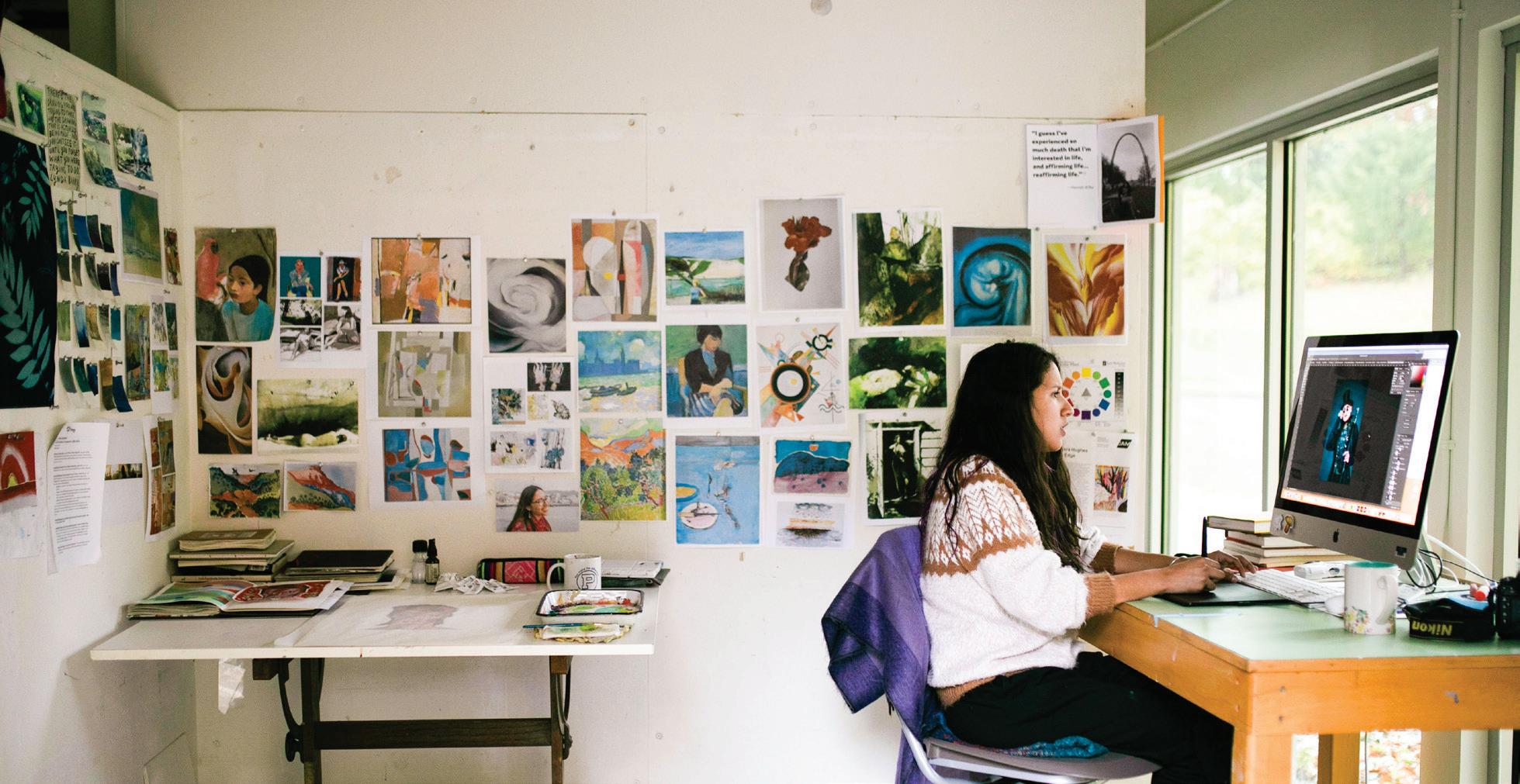
I chose Baldwin Wallace University because of the great faculty and the community. My professor of double bass is passionate about teaching, supportive, and pushes me to work my hardest and do my best. I chose a music performance major because of my passion to share music and become part of the musicmaking community. I love playing my instrument and I love playing with other people. Because of the smaller size of Baldwin Wallace, I can have personal learning experiences with faculty, and I have been given many unique opportunities I would not get in a larger music conservatory.
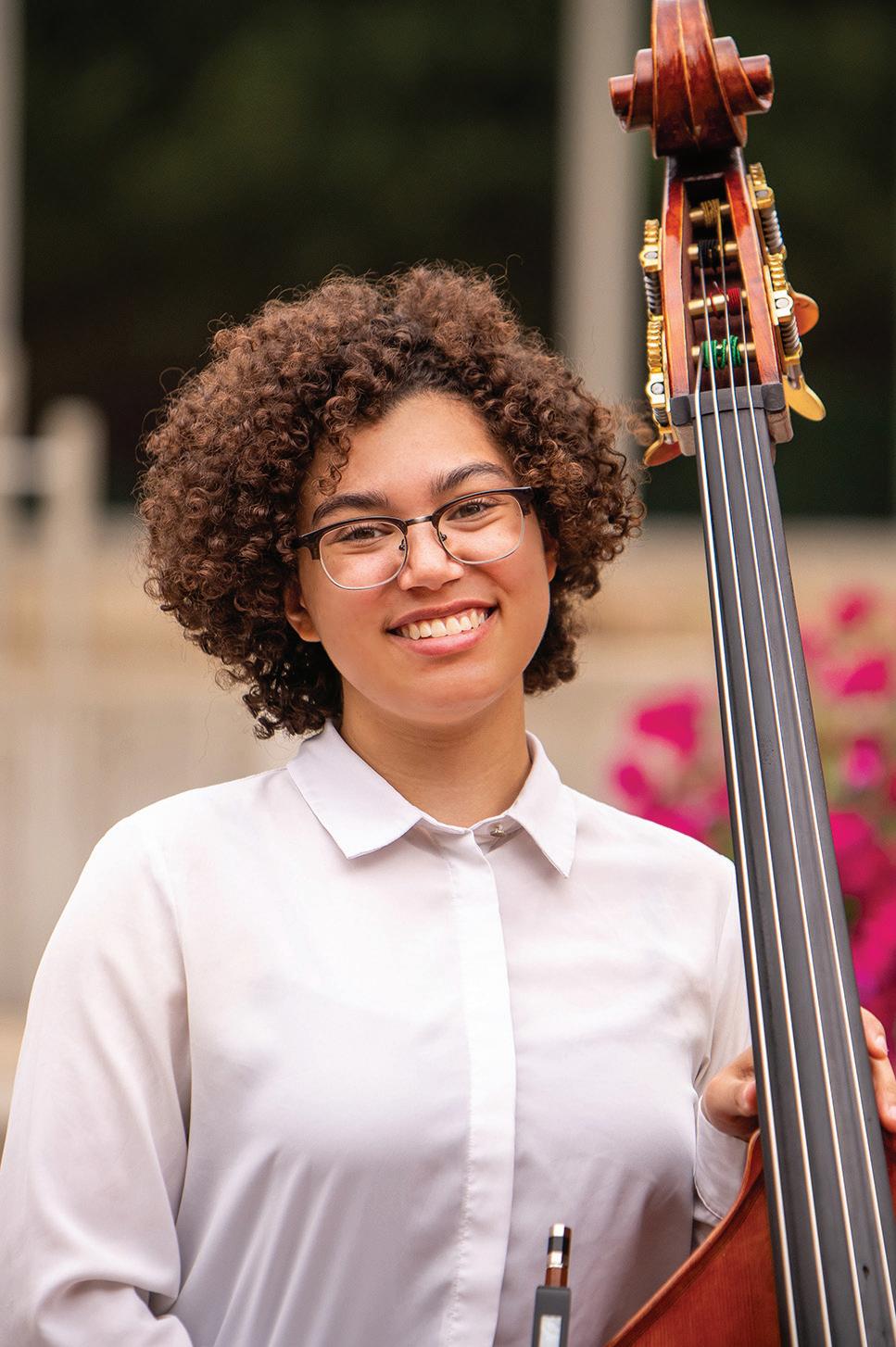
I hope to leave Baldwin Wallace with a clear direction to continue my learning so that I can take what Baldwin Wallace has provided me and continue to grow elsewhere. I have a small but supportive network of connections already and I have grown as a musician and a person. I have a long way to go in my progress, and Baldwin Wallace has been a wonderful start.
I had to prepare as a music performance major. Like most people who share my major, I have been playing my instrument and engaging in music for years. For my auditions, there was a selection of music that I had to prepare, selected by myself and by the schools I was applying to. I also had to prepare skills like scales and sight-reading music. Another part of my preparation was meeting the professors of double bass and the orchestra directors at each school.
A typical day for me starts at 8:00 am for my first class, Form and Analysis. I have lunch between the end of class and jazz band rehearsal. After rehearsal I spend time practicing, then attend my next class, Jazz Improv. I spend another few hours practicing, having a snack, and talking to friends before I have rehearsal with the Baldwin Wallace Symphony Orchestra. Once rehearsal is finished, the stage is cleared, and my duties as stage manager are complete, I commute home to do homework and see my cat.
My most memorable moment was performing and participating in my first Bach Festival at the end of my sophomore year. There was so much to learn from the lectures and guest artists and so much great music to play and listen to. It reminded me that finding community and being inspired by other artists is what draws me to music.
My advice is to look for schools with quality programs of your interest, but most importantly, look for faculty that you work well with. They are the people who will push you in the right directions and provide the stepping stones for your personal growth in your field. It should feel exciting and inspiring to have the opportunity to learn from them.

t’s all over the news. News pundits ask: Will artificial intelligence replace artists?
With the release of programs such as ChatGPT and Midjourney, it seems as if everyone is talking about artificial intelligence (AI). There are two main ideas in the current debates: either AI is changing everything and you should learn it right now; or, AI will destroy humanity and we should get rid of it right now.

As the Dean of a mutli-disciplinary school of the arts and design, I have paid close attention when these discussions involve the arts, especially amid suggestions that AI programs will replace creators with programmers or prompt engineers. This is what influencers are promoting online, but it’s not the whole story.
Despite some dire predictions, I don’t believe emerging artists and other creatives should worry that an AI program will replace them. It is important to remember that artists and art schools have been using AI and algorithmic tools for a while. As the University World News recently reported, AI is
prevalent in art schools. Here at York University, we have faculty specializing in AI and art, and the University received more than $100m for a research program focused on the ethical development and use of emerging technologies.
Our philosophy is that artists and designers should not fear but learn as much as possible about these tools. Emerging creatives should engage and experiment with new techniques because current processes will be changed and perhaps even improved. It is likely that some elements of the creative process will be automated. However, it may also be true that the skills we teach and learn in the arts will become even more valuable.
If you have used ChatGPT or Midjourney, you will have noticed how quickly these programs can synthesize large amounts of data into everything from convincing imitations of famous painters to dogs in spaceships. With correct prompting, AI programs can write convincing letters, explain
physics in the approximations of Shakespeare, and create convincing video simulations of people who have never existed.

What these programs cannot do is sew sequins on a homemade costume, dance in the park, or imagine something that has never been seen. These programs are masterful at combining and recombining existing digital data and they are excellent tools for artists’ pre-visualization work. It is fun to test the limits of one’s imagination in these environments, although rather quickly the works all begin to look similar.
This doesn’t mean that you cannot create great art with AI. The artist, Refik Anadol utilizes AI to create immersive exhibits and artworks. His vision, scale, and the meaning behind his works distinguish them from other forms of digital art. It is both the imagination and integration of new elements and the craft of creation that are still exclusively in the domain of human artists.
As the tools of digital creation become increasingly commonplace, artists will distinguish themselves through the material craft and manual skills that are becoming rarer and thus more valuable. The techniques of art-making are always changing, but the fundamentals of pictorial representation, sound and storytelling have remained mostly constant. Each new innovation – including graphite pencils, photography, word processors, cinema, and algorithms -- changes the techniques of creation. But at the core, creativity is a fundamentally human act.
I look forward to what a new generation of artists - equally skilled in digital and traditional techniques and practices - will do. I believe no AI program is ever a replacement for each student who makes our collective creativity possible. •
 Sarah Bay-Cheng, PhD Dean & Professor, School of the Arts, Media, Performance & Design | York University (Toronto, Canada)
Sarah Bay-Cheng, PhD Dean & Professor, School of the Arts, Media, Performance & Design | York University (Toronto, Canada)
I chose Anderson University because its professors and students were the type of people that I wanted to be surrounded by for four years. God-fearing, creative, knowledgeable, supportive, and talented. It was made very clear to me that the foundation of this university is the gospel of Jesus Christ.
Also, the university proved to me that they were going to invest in me, not just monetarily, but by giving me opportunities and attention that larger schools could not afford to give.
I chose the commercial music major because I knew my passions and talents lied in music, but I was not sure yet where I wanted to focus those talents. The commercial music program is very broad and allows for students to taste a lot of different experiences and responsibilities to see which the student gravitates towards.
I wanted to spend four years tasting a bunch of different areas within the world of music. That is exactly the sort of education I received. As a performer, I've been on stage playing piano, keyboards, synthesizers, drum set, percussion, electric bass, melodica, vocoder, and even triggering Ableton through a novation launchpad. I've performed with commercial ensembles, choirs,

orchestras, music theatre shows, jazz combos, big bands, and worship teams. I've gotten to arrange, orchestrate, music direct, and conduct on many different occasions. I received a lot of creative liberty that truly blessed my education by letting me passionately run after any new idea that excited me.
I felt very prepared for this major. I had a background in performing, with choirs, jazz bands, orchestras, and worship bands. I also had begun an online presence, which has blossomed during my college career. Lastly, I had a head start in the theory program because music theory was my obsession in high schooI. This is not necessary, but it enabled me to not have to stress about a freshman level theory course, because my foundation was solid.
The typical day as a commercial music major in AU is really special. I would start my day by grabbing a breakfast sandwich at Chronicles Cafe. Then, I would do my daily bible study before my first class. Then, I'd go to some of the various exciting music courses offered here (some of my favorites were Conducting I, Orchestration, Entrepreneurship, and Theory V). Grab lunch with some friends after class at Chick-fil-a.
Then I'd head back to the fine arts center to run a rehearsal with my commercial music band. We'd often grab dinner together in the Culinary Center after rehearsal. After that I'd often spend my evenings either having a jam session with my fellow students, working in the recording studio on an album, or attending a performance of a friend either on or off campus.
Probably the jam sessions will be the most memorable. We spend so much time in rehearsals and shows together, playing pre-arranged, programmed music, and it's always very fun. But, when we can all get together in a rehearsal room or in the auditorium late-night, and just freely express ourselves... there is no feeling more special. It's like one big party celebrating music, each other's talents, and a very good God. Somebody starts improvising some lick, and the night takes off. No one knows where it will end up, but it is always special. It's my favorite aspect of the culture here at Anderson University's commercial music program.
Bachelor of Arts in Music
Double Major with Music
Bachelor of Music Education

Bachelor of Music in Performance



For Open House and Audition dates, go to: www.gettysburg.edu/music



I www.gettysburg.edu/music
F
What inspired you to become an artist?

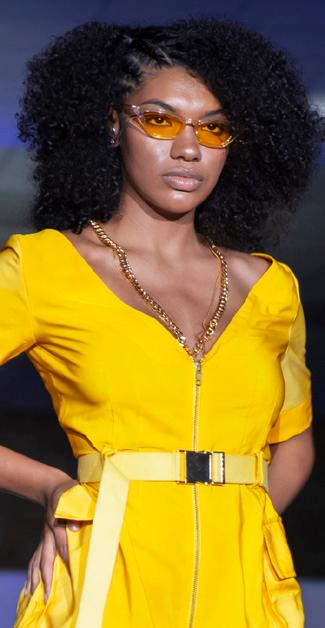

I’ve always wanted to become an artist ever since I was little. Right from my childhood, I was absolutely fascinated by many animated shows and comic art. This instilled in me a desire to pursue the same creative process.


Can you describe your winning artwork and what inspired it?
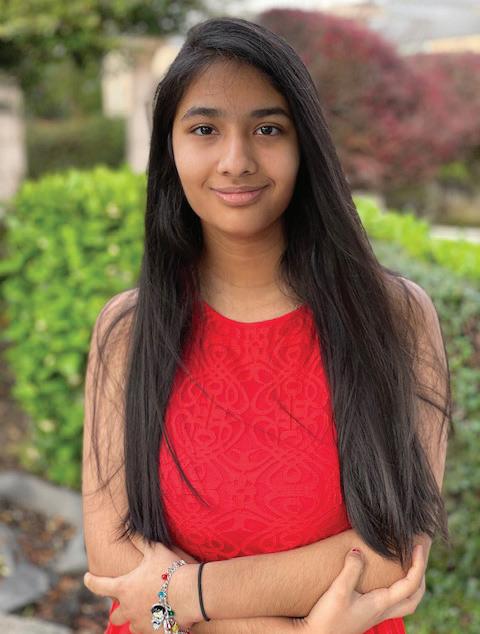



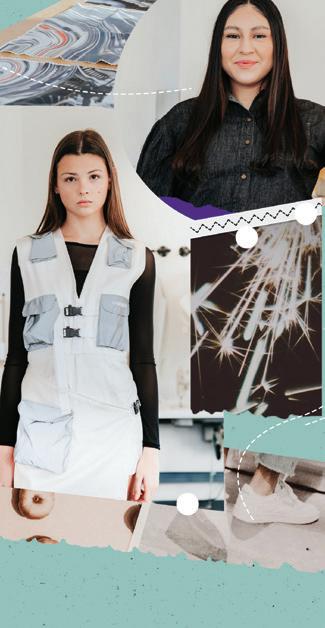




My artwork consists of a cast of people from different backgrounds following their artistic

passions. Since the theme was “Artists of the Future”, I wanted to include a group of diverse ethnicities to show that no matter who you are, you can pursue whatever creative ambition you desire.
What inspired you to participate in the 2023 Performing & Visual Arts Colleges Cover Contest?



My mother sent me an email with the contest outlines, and I was interested in the content. I had never made a brochure cover design before, so I was excited to try and see what I could do.
Who are your biggest artistic influences?
One of my biggest artistic influences comes from the Ghibli movies. I love the artistry and realism that Miyazaki creates. The powerful storytelling conveyed through the characters really captivates me. For other specific influences, Xiao Tong
(@velinxi) and Emily Xu (@emilyamiao) are my favorite Instagram artists. I love their vivid compositions and colors.
How do you see your art evolving in the future?
As the years go on, I hope my art keeps improving. My aim is to be able to draw at the same level as my inspirations. Even though that goal seems far away, I'll keep striving to do my best to accomplish it.
What are your artistic and/or academic aspirations for college and beyond?
Whatever I do in my future career, I want to have some aspect of it contain an artistic element since I love the field so much. If I could successfully combine my passion and work, it’d be a dream come true. •
I have been on Seton Hill University’s campus from a young age, and every time I was on campus, I felt right at home. It sealed the deal for me when I went to Seton Hill Open House during my junior year of high school to learn more about the university and the program I was interested in. I went to a small high school about ten minutes from Seton Hill, and I loved the small atmosphere from my high school. I wanted that same small atmosphere when I went to college.
Growing up, I had always been interested in movies, special effects, and animation. My favorite movies were Marvel movies, and I knew I wanted to get into something where I could create something I love. So, when I discovered that Seton Hill had a Graphic and Interactive Design program and I could concentrate on animation, I knew it was the place for me.
When entering the program, I wanted to learn more about the different paths that graphic design can take me. I knew I wanted to do animation and work for Disney or Pixar due to my love for their movies and animations. In the last three years, Seton Hill has opened my eyes to different job opportunities around me after learning about the various graphic design fields. I wasn’t sure what I wanted to do.
My professors allow us to learn and develop different skills for each area. I learned how to design websites, which caught my attention, then I learned about UX designers (User Experience), and it also caught my attention. Seton Hill University allows students to dip their toes into different job opportunities through internships.
My graphic design class in high school introduced me to Adobe Photoshop. I didn’t have much experience with Adobe products. I was then introduced to other Adobe products, like Adobe InDesign and Illustrator, during my freshman year of college.
My studio classes are Monday through Thursday. They can either start in the morning or start in the afternoon. They are about three hours long which is divided up into sections. The first hour and a half is lecture time, where my professor will introduce background information.
For example, during my History of Animation class, we would learn about a period of animation and take notes. The last hour and a half would be studio time to work on any projects relating to the period. After classes, I would meet up with friends and find different spots on campus to catch up or do work.
Picking the right college is hard and intimidating. Trust me, you will find the college that makes you feel right at home and makes you want to keep pushing yourself. It is scary, but you will find that place that helps you become the person you want to belike I did with Seton Hill.

DEPARTMENT OF MUSIC
COMMERCIAL MUSIC (B.M.)
MUSIC (B.A.)
MUSIC EDUCATION (B.M.)
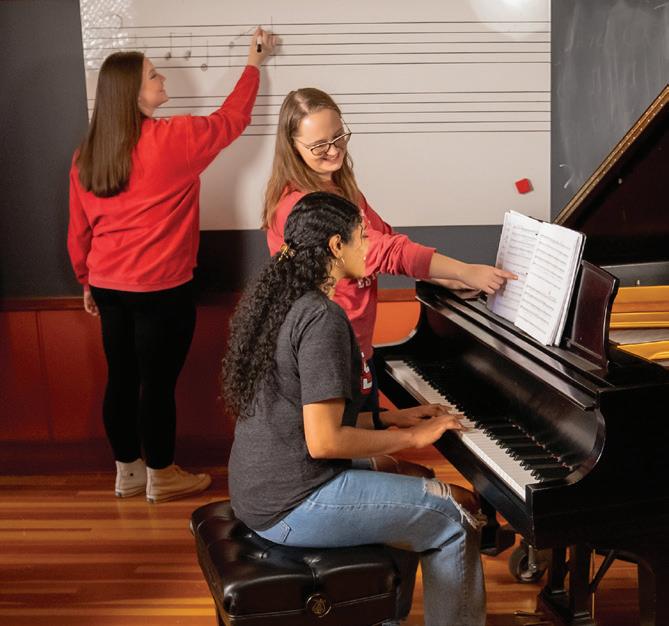
MUSIC PERFORMANCE (B.M.)
MUSIC THERAPY (B.M.)
SACRED MUSIC (B.M.)
DEPARTMENT OF THEATRE & DANCE
DANCE - CHOREOGRAPHY (B.A.)
DANCE - PEDAGOGY (B.A.)
DANCE - PERFORMANCE (B.A.)
DANCE - PRE-DANCE/ MOVEMENT THERAPY (B.A.)
THEATRE – MUSICAL THEATRE (B.A. & B.F.A.)
THEATRE ARTS (B.A.)
THEATRE BUSINESS (B.A.)
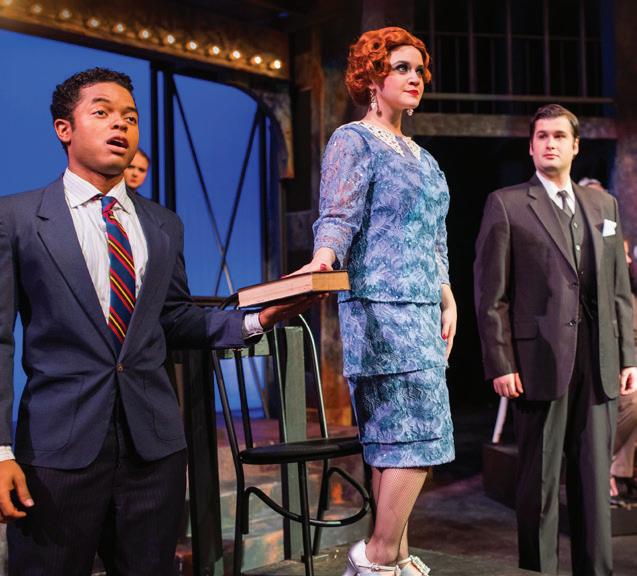
THEATRE DESIGN & TECHNOLOGY (B.A.)
THEATRE PERFORMANCE (B.A.)
DEPARTMENT OF ART & DESIGN
ARTS ADMINISTRATION (B.A.)
ART EDUCATION (B.A.)
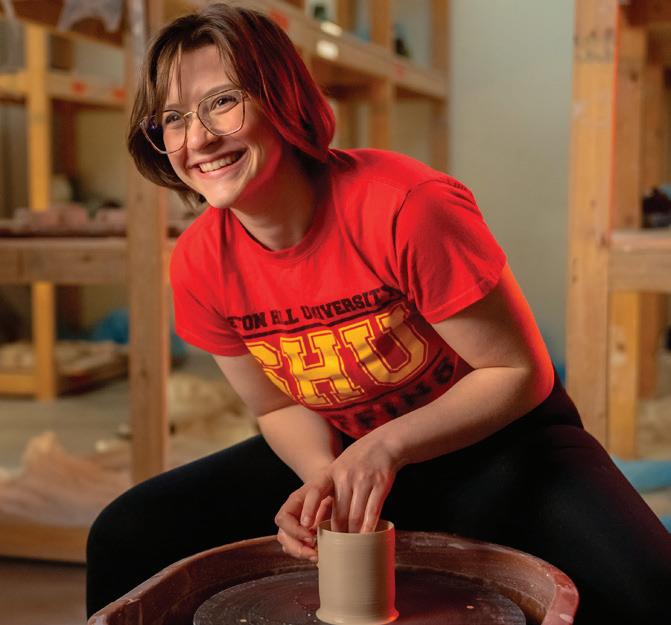
ART HISTORY (B.A.)
ART THERAPY (B.A. & M.A.)
FINE ART STUDIO (B.F.A.)
GRAPHIC & INTERACTIVE DESIGN - ANIMATION (B.F.A.)
GRAPHIC & INTERACTIVE DESIGN - PHOTOGRAPHY (B.F.A.)
STUDIO ART (B.A.)

After high school I knew that I wanted to get into acting, but I couldn’t decide If I wanted to act for the stage or the camera. My theatre teacher had told me about the acting program at AMDA and how intense the training was. Some of her previous students had attended the school. After going through AMDA’s website, I was very adamant about attending this school for its BFA acting program. That was until I read through their Music Theatre program. I had just finished doing a musical at my school, and even though I wasn’t the strongest singer, in the back of my head there was this slight joy I felt whenever I sang. That small voice in the back of my head grew louder the more I read about the program. In the end it was my family who persuaded me to switch my training to musical theater. Why learn only how to act when you can learn how to sing and dance as well, they told me. And, oh boy, am I glad I listened to them. Never did I think in three years I would grow to be such a strong singer.
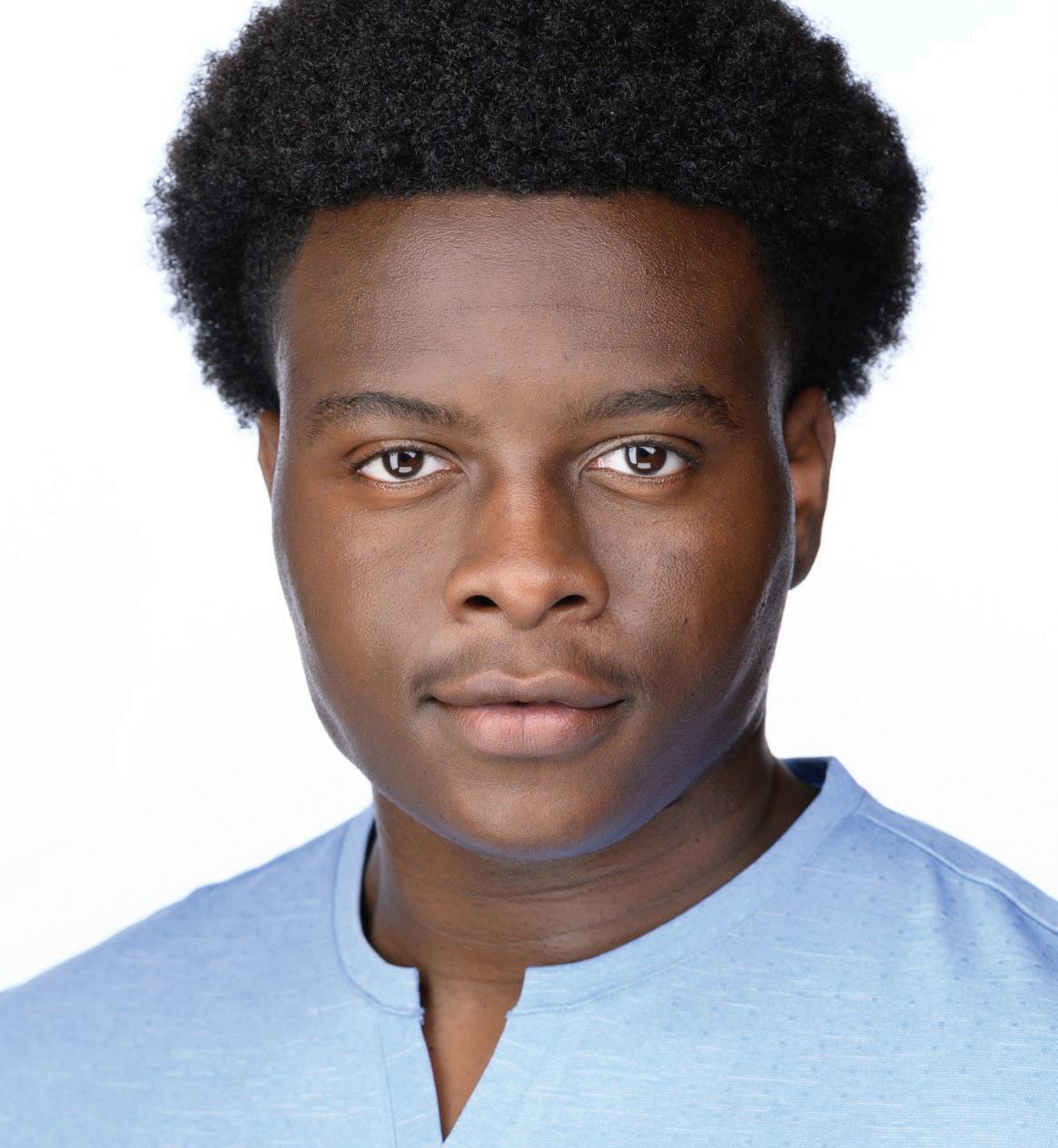
Yes, before auditioning for AMDA my theater teacher and I went through three songs and some monologues that sat comfortably in my voice. For my three songs I focused on “Hold Me in Your Heart” from Kinky Boots, “Music of the Night” from Phantom of the Opera and “Don’t Let Me Go” from Shrek the Musical. My teacher made sure I had a dramatic song, a classical song and a comedic song. As for my monologue, I did a comedic scene from the most recent musical I was in, The Wedding Singer.
What Was a Typical Day Like at the AMDA College of the Performing Arts?
A typical day at AMDA always started with me warming up and putting on a concert in my shower at 8 a.m. The days are long here at AMDA. There is a lot of good work to be done, and I cannot stress enough how important warming up first thing in the morning is. My first class is usually a Gen Ed class such as math and English composition. After that my next classes would be either my MT core classes, where I got to work on duets, trios, audition techniques and songwriting with my other classmates, or acting classes, where I got to work on monologues, scene study, off- and on-camera work and improv, or dance classes, where I took Tap, Jazz, and Ballet. Later in the day I would head out to rehearsals for the BFA shows, mostly the BFA musicals. The musicals are so fun to do here at AMDA!
What Was the Most Memorable Moment of Your Time at the AMDA College of the Performing Arts?
My first memorable moment would have to be my final bow during my last BFA musical. The productions here are so beautiful to be a part of. The costumes, mics and lighting make you feel like you're a professional. After being a part of every show since my first semester, it was so rewarding to be able to get up on stage and share one last bow with my friends. My second most memorable moment would have to be first semester when my new group of friends and I held a Secret Santa get-together in the dorms. On campus most of the fun will come from the connections and the families you create off stage rather than on stage. And I guarantee you these connections will last for eternity.
Study and perform in New York City and Los Angeles

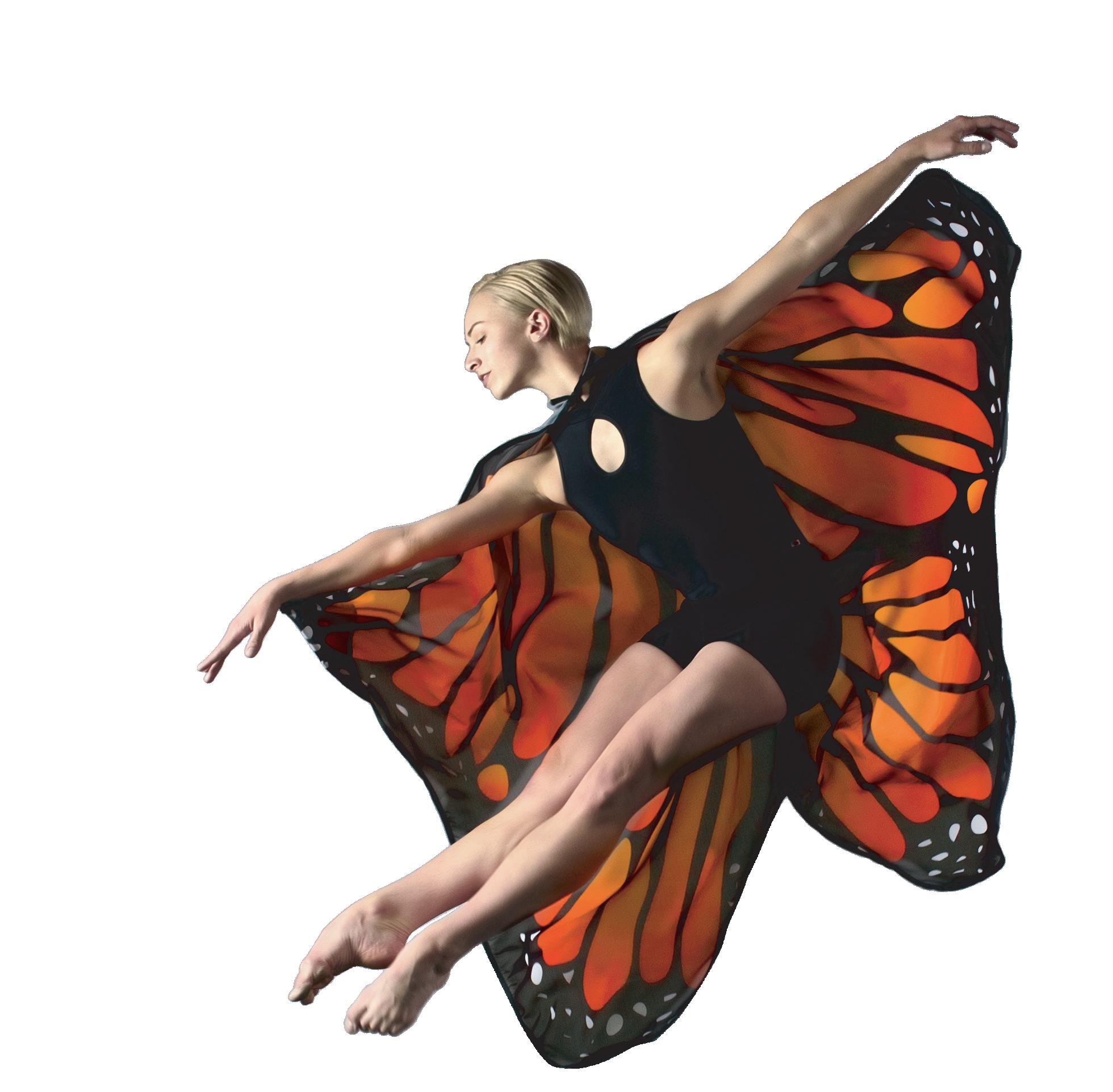
Earn your degree
online
Bachelor Degrees
Associate Degrees
Master Degrees
Certificate Programs

High School and Gap Programs
Schedule Your Audition Now!

Train in the heart of London at a top UK performing arts institution
Three-year degrees include: Acting Applied Theatre
Musical Theatre
Playwriting
Theatre Crafts, Design & Production
Find out more at www.cssd.ac.uk/undergraduatecourses
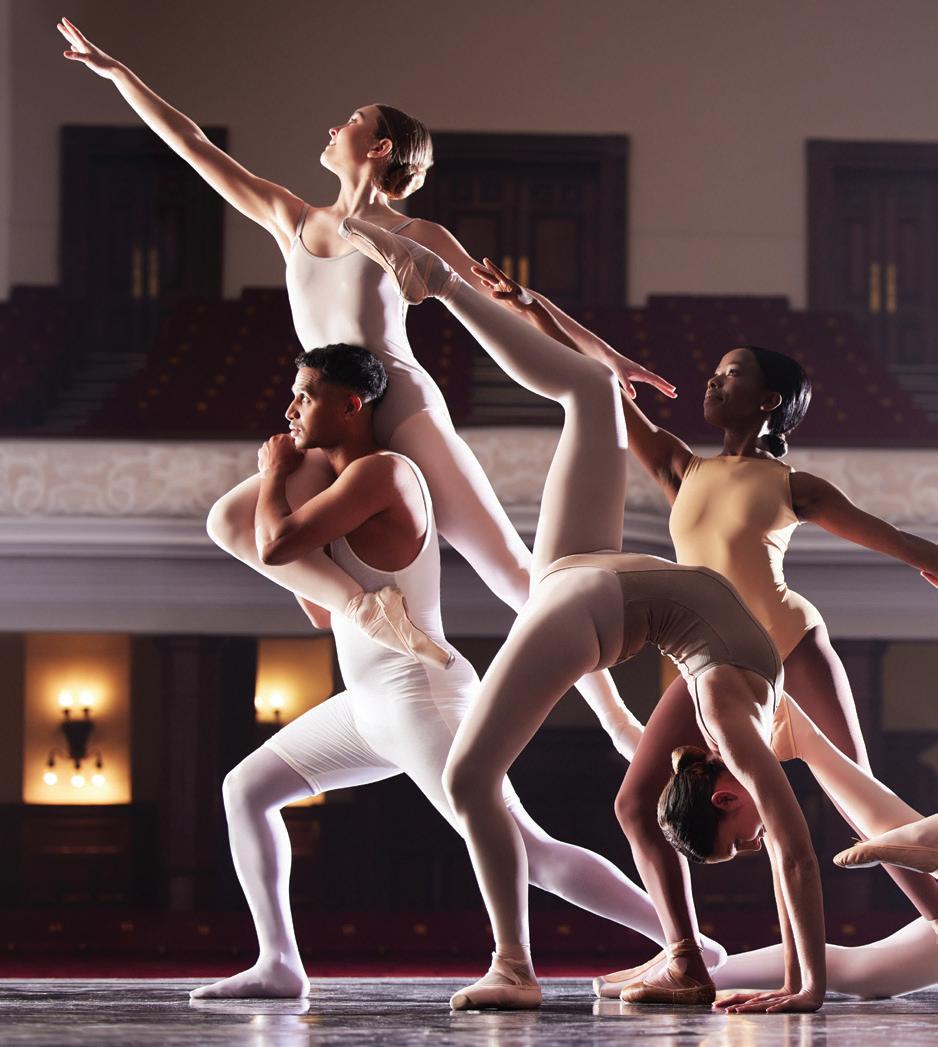
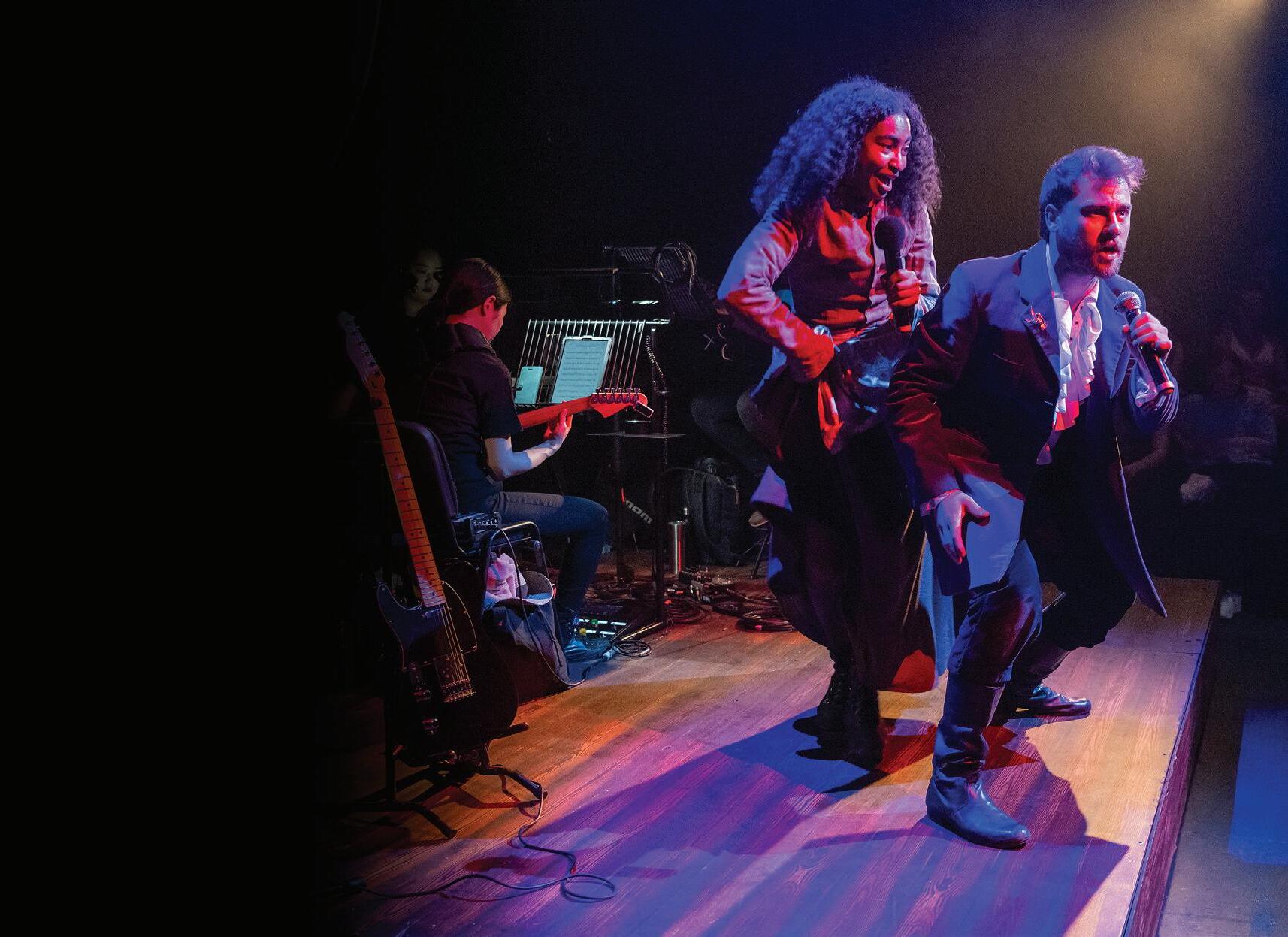
Every year, students across the country are hoping to find scholarships that go towards completing their college degree. Each field of study has scholarships with different requirements, with performing and visual arts offering opportunities for students in every field from writing to design. Here is a list of scholarships available for 2023 and 2024.
To find out if you qualify for a particular scholarship, go to their website to learn more about the requirements, timeline, and potential benefits you will be awarded.
VISUAL ARTS:
• NSHSS Creative Writing Scholarship
• NSHSS Film and Video Production Scholarship
• NSHSS Visual Arts Scholarship
• Project Yellow Light
• AIGA WorldStudio Scholarships
• Print and Graphics Scholarship
PERFORMING ARTS:
• NSHSS Performing Arts Theater Scholarship
• Classic Center Cultural Foundation Performing Arts Scholarship
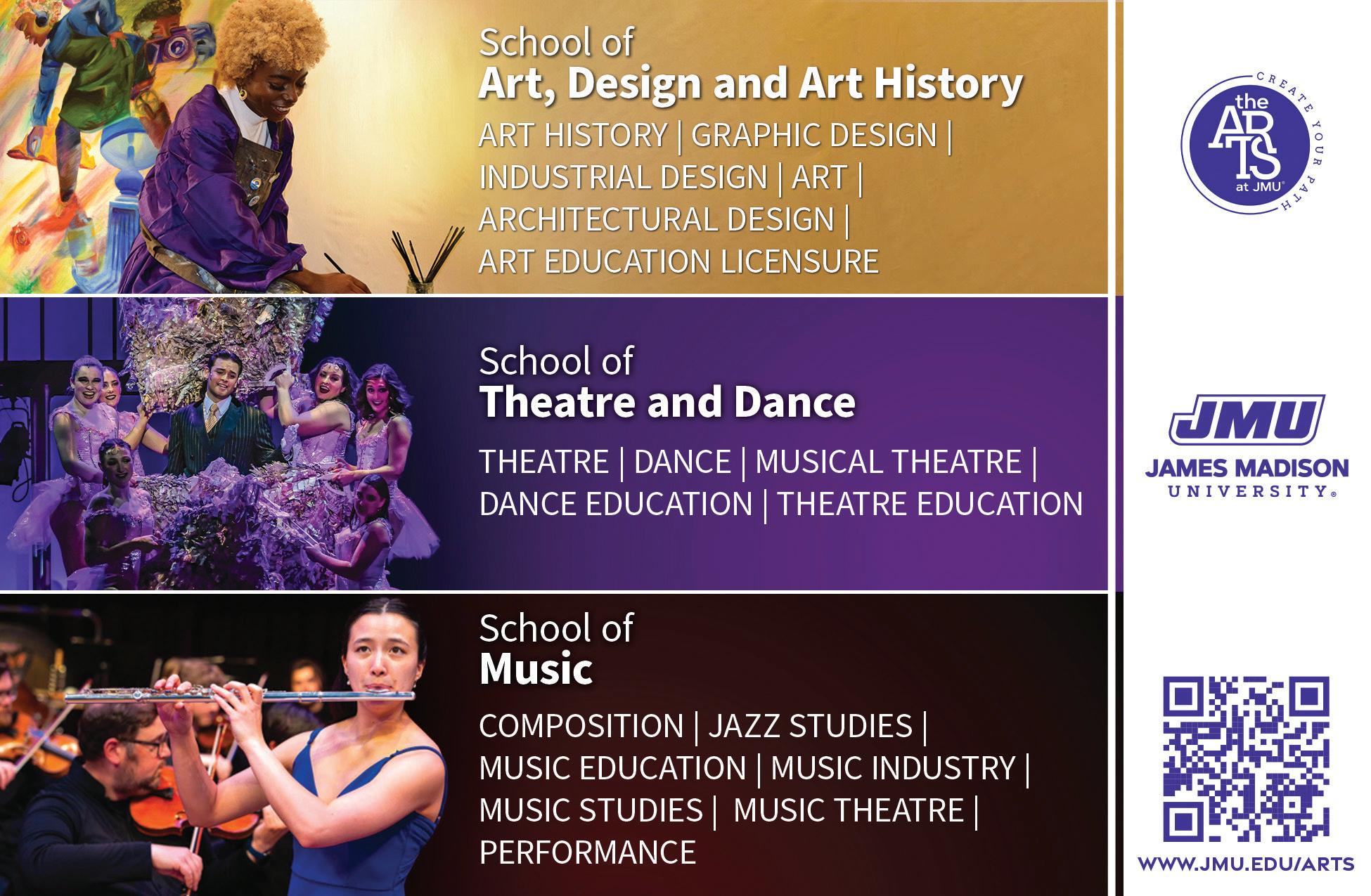
• Congressional Black Caucus Spouses Performing Arts Scholarship
• Educational Theatre Foundation Scholarships
DANCE:
• NSHSS Performing Arts: Dance Scholarship
• Joan Myers Brown Equity Scholarship
• Dizzy Feet Foundation Scholarship Award
• NHSDA Artistic Merit, Leadership and Academic Achievement Award
MUSIC:
• NSHSS Performing Arts: Music Scholarship
• VSA International Young Musicians Award Program
• Schmidt Vocal Arts Scholarships
• Flying Musicians Association – FMA Solo Program/Scholarship
• Yamaha Young Performing Artists Competition
ALL ARTS/HONORABLE MENTION:
• YoungArts
• Against the Grain Artistic Scholarship
The first thing that stood out to me about Ringling College’s Film program is that it has an incredible hands-on experience approach. From day one, we are learning the basics of filmmaking and advancing our knowledge every step of the way, all the way through senior year. Beyond the department, Ringling College also has incredible extra-curricular activities that allow me to work with real clients and expand my knowledge of how the industry functions. Finally, our Career Services department is a life-long resource for students and alumni. I am extremely grateful for attending such a supportive school.
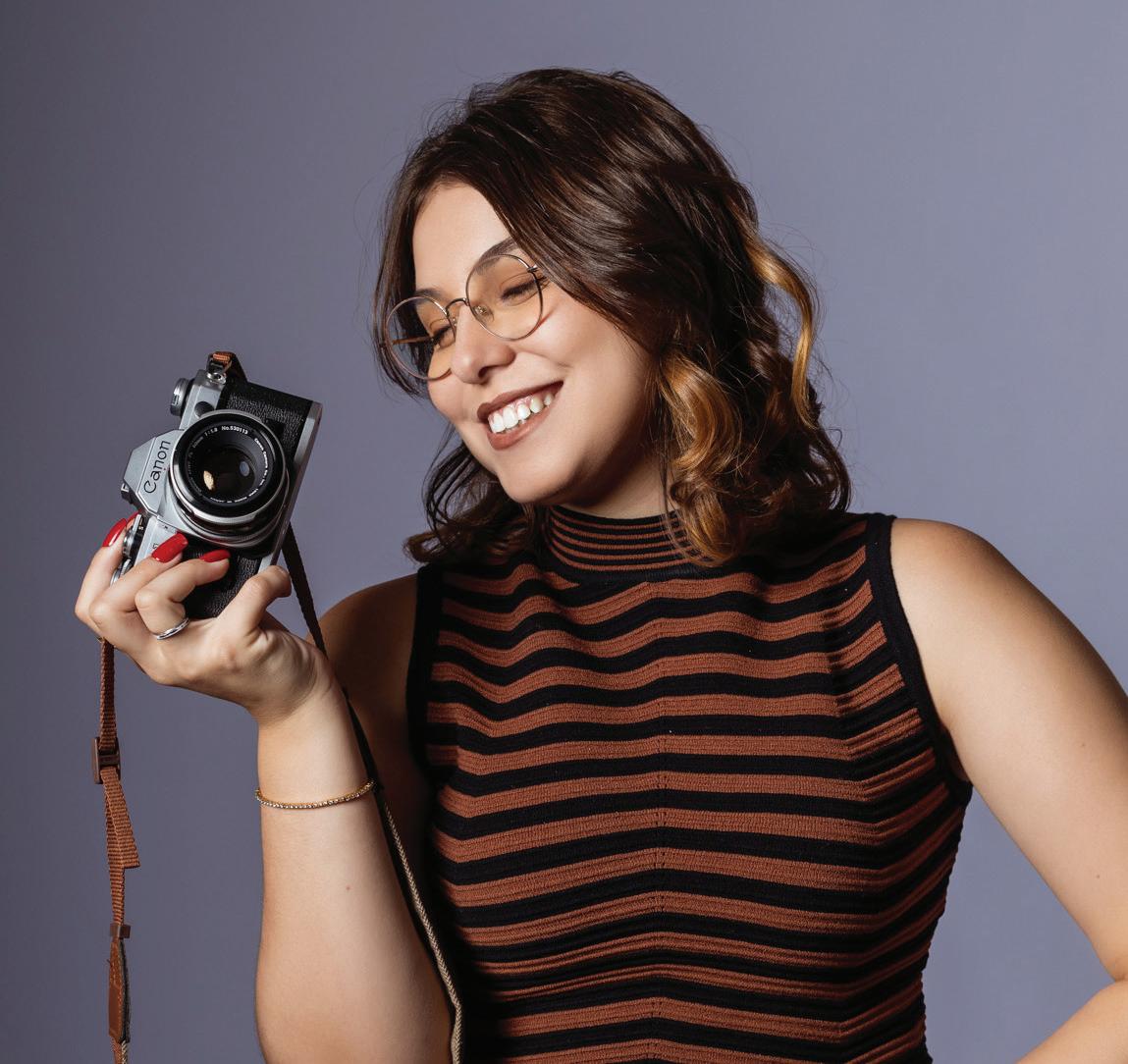
As a learning objective, I hoped to develop my filmmaking skills, especially directing and cinematography. I feel very fortunate to have had so many opportunities inside and outside of class to work on these abilities. As a community objective, I hoped to find like-minded people with whom I could share my love for the arts. The community my peers and I have built over the years has been the highlight of my experience here. I have received more love and support than I could have ever hoped for.
Unfortunately, I never had any practical art classes at my high school. Most of what I learned before attending, I pursued on my own or through workshops. For anyone who is considering applying to Ringling College, I would definitely recommend attending the summer PreCollege program. You get to connect with faculty and meet current students who are working as teaching assistants. All of that plus you take immersions in your desired field of study and get to participate in fun activities on and off campus. As a cherry on top of this amazing experience, Ringling also has opportunities for scholarships for engaged students.
Breakfast at our state-of-the-art dining hall, Cunniffe Commons, followed by class. In the afternoons when I don't have class, I usually do homework at Goldstein Library or pick up a student worker shift at the soundstage (part of Ringling’s Studio Labs complex) the or the photography studio. After dinner, I usually go to the film lab to edit my projects. The days can get busy very quickly, so every so often I try to find moments to take a break and watch a funny sitcom.
Avant-Garde is an iconic scholarship fundraiser at Ringling College that happens once a year on Scott Plaza, at the heart of our campus. It is a costume party and the themes switch every year and range from the café scene in Paris to 70s rock-n-roll. A lot of our students get to volunteer and be part of the event, surrounded by donors and friends of the college as they raise paddles to donate funds toward student scholarships. It's pure joy and an incredible tradition that provides an opportunity to celebrate the amazing community we have built over the years.
What Advice Do You Have for Teens Looking At Ringling College?
Reach out to current students and alumni. We love talking to prospective students, and that's a great way to gauge whether Ringling College is the right fit for you. Every college has a unique culture, so I invite you to learn more about ours. If you decide to join the family, we would be so pleased to welcome you!

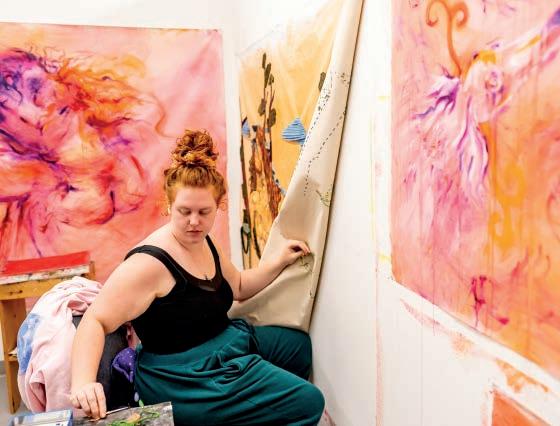
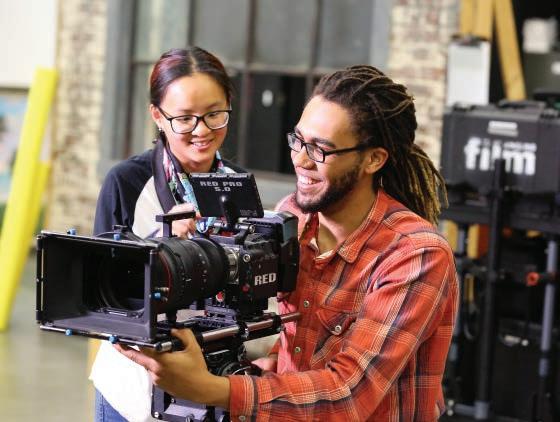
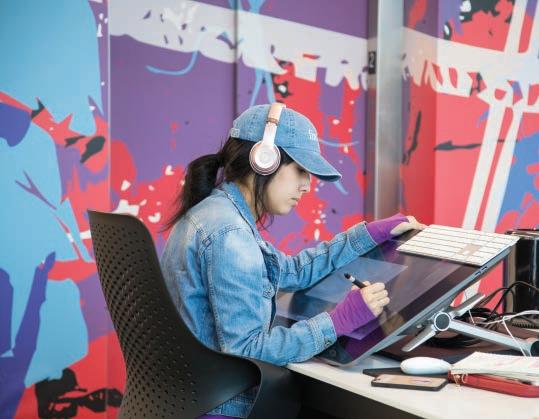
any people attend a performing & visual arts college with the hopes of building a career out of their greatest passion. One of the ways to start your career on the right foot is to participate in an internship.
Internships come in all shapes and sizes. They can vary in duration, minimum age, and what you can expect to learn during the internship. While there are thousands of opportunities out there, here are some paid internship opportunities that you won’t want to miss!

Did you grow up watching your favorite cartoons and dreamt about making your vision come alive? Here are some opportunities with the great powerhouses that are household names.
The application opens on July 1st and closes August 1st. It offers several different paths based on your interests. Are you interested in storyboarding, visual development, or CG? Whichever path you pick, you will need to provide a portfolio of your personal work, a one-page resume, and a half page letter of intent.
The program is six months long and you must be at least 18 years-old and legally allowed to work in the United States. Visa and sponsorship opportunities are not available through this internship.
This 12-week internship includes direct mentorship and training in a classroom environment. You can choose one of four paths: animation, story, technical director, and layout. Many of their participants went on to work in different fields »
within animation, like editorial, production management, and software research & development.
In order to qualify, you need to be either enrolled in an undergraduate/graduate program or have graduated within one year from the start of the internship. You could also apply if you are in a career transition and have at least five years of professional experience that is not related to animation, VFX, gaming, and other computer graphics-focused fields.
Finally, they also accept individuals who have served in the Armed forces or have been homeschooled (self-taught). While Pixar is not able to offer any visa or sponsorship for interns, they do offer paid internships and housing assistance for interns who are not local.
But, keep in mind that Pixar’s internship program does not have a set start or end date. Individuals interested in an internship at Pixar need to check their job board and see if the proper type of internship applies to them.
Video games are more popular than ever. You can now play and connect with players around the world from your desktop, phone, console, and more. If you ever played your favorite game and wished you could be part of the amazing experience, then an internship with a top gaming company might be for you!
Like Pixar, Playstation internships are an “as needed” basis. This means you need to regularly check and see if an opening becomes available. To qualify, you need to be currently enrolled in an accredited university, either for an undergraduate or graduate degree. While they do not offer sponsorships or visas for the internship, students who are currently in the United States with an F-1 visa are allowed to apply. Additionally, the specific requirements for each internship varies on the focus.
The Stetson University’s Theatre Arts Program produces atleast four main-stage shows per year and emphasizes creativity, collaboration, critical thinking and cross-disciplinary approaches.

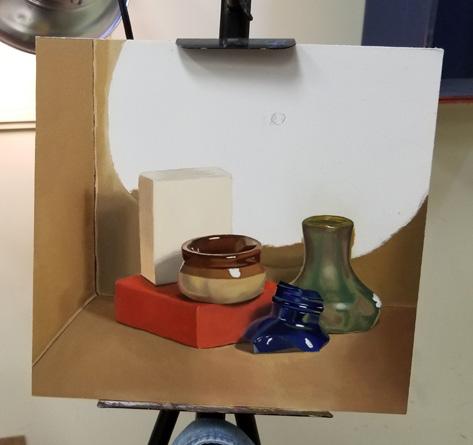
Choose a double major and, if you need it, the fifth year is tuition free.* Selecting a second major is a great way to stand out to employers and graduate schools.

When you start and finish your bachelor’s degree at Belhaven, you can add your master’s degree anytime, anywhere in our nationally acclaimed Best Online Program by U.S. News and World Report.
Riot Games is the creator of the popular game League of Legends. In order to qualify for an internship at Riot, you need to be actively taking courses from a college, university, or an accredited program. This means you do not need to be pursuing a degree but could also be taking a certificate course.
If you are living in Germany, Ireland, or the UK then you do not need to be enrolled in any courses and can apply for a position in their program. You must be able to work full-time for the duration of the internship and be authorized to work in the country where you want to work.
Interns will receive competitive pay and are considered full-time employees. Interns in North America will also receive relocation assistance and housing assistance in order to be near their assigned office. But, the internship positions are opened as needed. Be ready to check their job board to see if any positions apply to you.
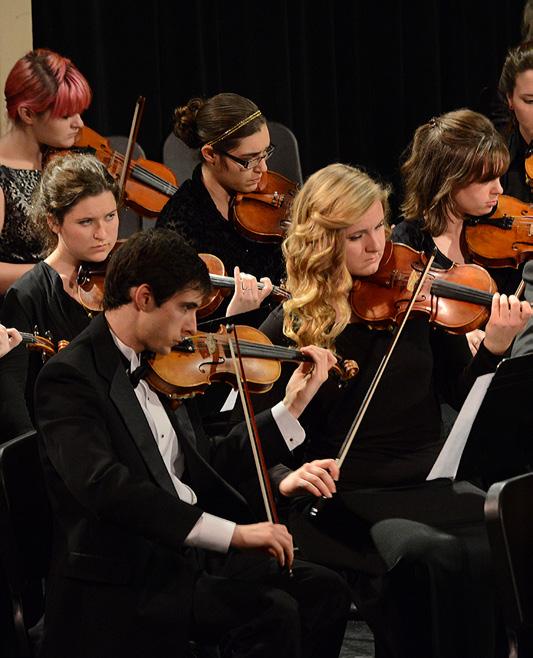
Internships aren’t just limited to animation and design. If you are passionate about the performing arts and want to be part of a theatre, then you can find an internship at theatres big and small throughout the United States.
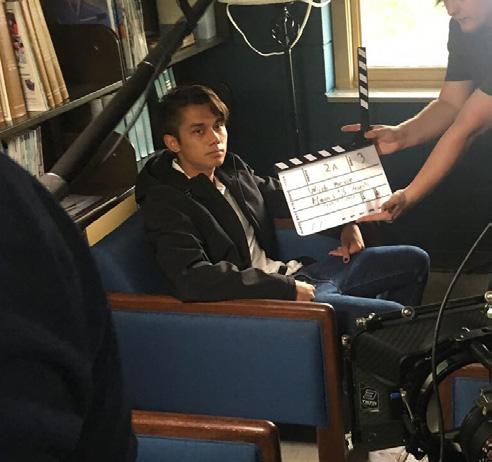
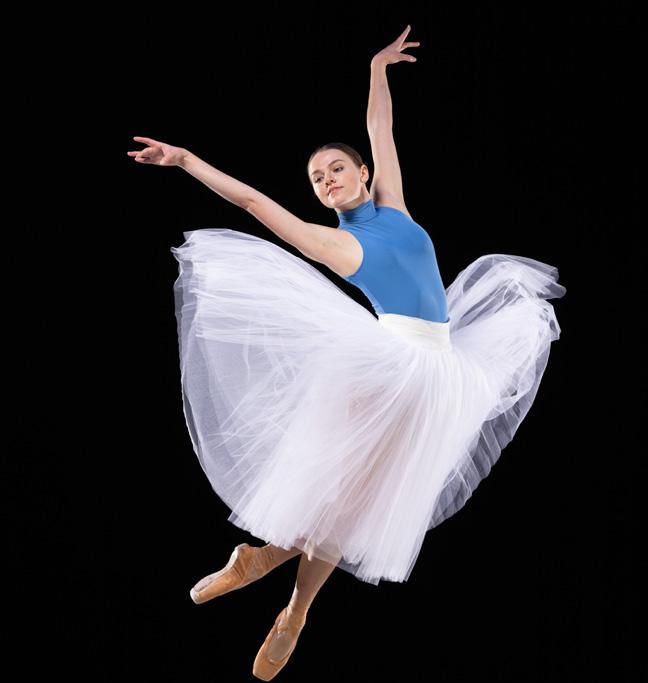
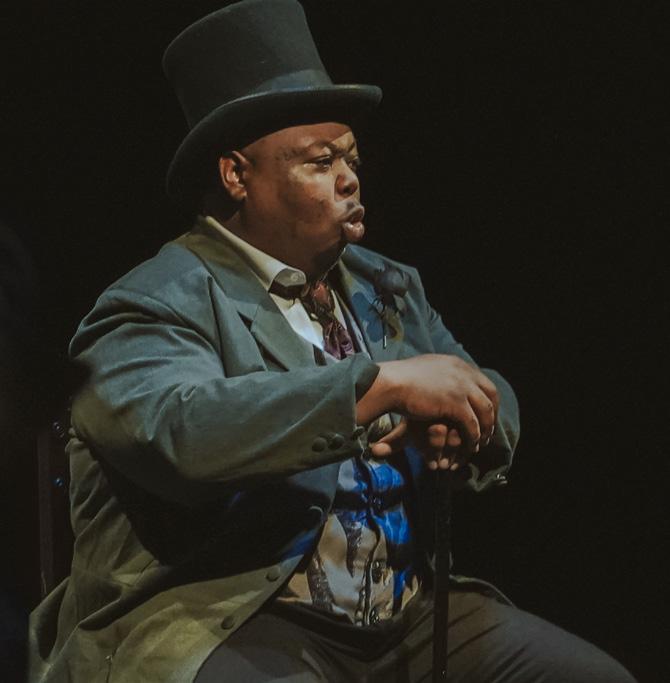
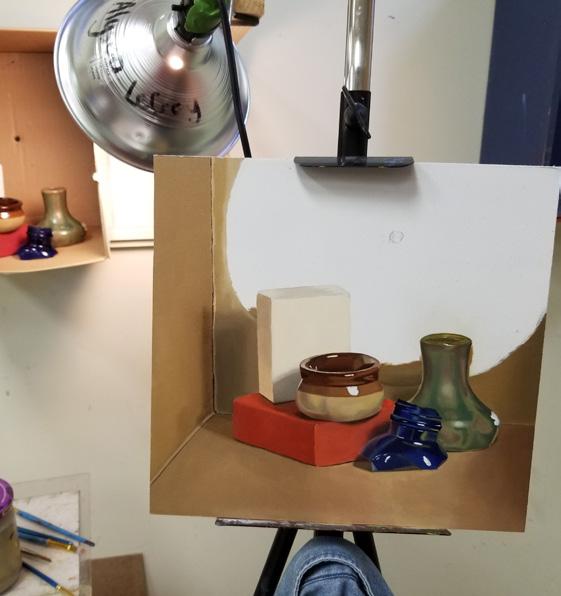
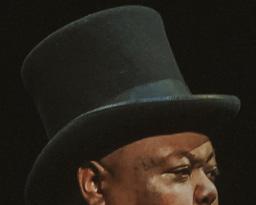

A non-profit theatre based in New York City offers unique internships based on your focus. Do you want to help with the artistic element of theatre like scripts and readings? Maybe you want to help with fundraising or community outreach? What about mentoring students, helping with the finance department, or marketing? While there are no acting, directing, or production internships available, you can be part of this community and learn about what it takes to run and operate a theatre company.
The internship is a full-time position for the summer with applications submitted in January and interviews occurring between March and May.
Applicants are not required to have a college degree, but they need to have a work history or background that is relevant to their internship. Housing is not available but the internship is paid. While international interns are accepted, they are responsible for the necessary paperwork to be allowed to work in the United States.

This is an extremely competitive internship but it could open doors for an apprenticeship and Roundabout’s Career Development program.
This internship is open to college undergraduate and graduate students who want to learn about all of the aspects that go into the background of theatre production and management. This includes anything from community partnerships to lighting to costume design. They offer fall, spring, and summer internships with applications opening in August, December, and April.
The internship duration and total hours depends on whether you apply as an undergraduate student or graduate student. The undergraduate internship lasts for 10 weeks and can be from 10 to 16 hours
per week over two days. The graduate internship lasts for 13 weeks and requires 20 to 32 hours per week over three to four days. However, interns should expect to allow for fully flexible commitment over the length of their program.
Interns can either receive college credit or a stipend, based upon the hours of week you work. International students are also welcome to apply but it is up to the student to secure the visa and documentation to attend. Students should also keep in mind that if they have graduated or been out of school for more than one semester (for undergraduates) or a year (for graduates) then they are not eligible for the internship.
Finding the right internship can be daunting. There are so many options out there with different requirements, timelines, and benefits. So what’s important is to decide things like where you want to be for your internship, how long you can commit to it, and what you need to qualify. Once you determine those elements, then you can narrow down your options and apply to the ones that are best for you! •

Looking for an art school? Here are some colleges that offer great programs in music, theater, dance, graphic design, film production, arts management, gaming and more.

AMDA COLLEGE OF THE PERFORMING ARTS
Location: Los Angeles, CA & New York, NY
Majors: D, F, M, MT, T amda.edu
For 60 years, AMDA College of the Performing Arts has launched some of the most successful careers in theatre, film and television. AMDA creates industry professionals who don't just wait for life to happen—they stage their own career path. AMDA graduates take the world's stages, film sets and movie screens, changing the way we think about art in the 21st century. Learn More »
ANDERSON UNIVERSITY: SOUTH CAROLINA SCHOOL OF THE ARTS
Location: Anderson, SC
Majors: D, F, G, M, MT, P, T, V andersonuniversity.edu/ school-of-the-arts
The South Carolina School of the Arts at Anderson University trains professional visual, musical and theatrical artists who are serious about both their art and Christian faith. Staffed by highly trained and world-class artists, musicians, actors, dancers, theatrical designers, and scholars. Students develop their artistry to its fullest potential so they may thrive professionally and serve others through the arts. Learn More »
BALDWIN WALLACE UNIVERSITY
Location: Berea, OH
Majors: M, MT
bw.edu/schools/ conservatory-music
The Baldwin Wallace University
Conservatory of Music, located 20 minutes from Cleveland, Ohio, offers professional bachelor's degrees with an emphasis on experiential learning. The Conservatory is an artistic community within a private, liberal arts university, affording students many choices for leadership and performance. Learn More »
Location: Great Barrington, MA
Majors: D, F, M, P, T, V, O simons-rock.edu
Bard College at Simon’s Rock is the only college in the country specifically designed for students ready to enter college after the 10th or 11th grade and begin working on their Bachelor’s Degree two years early. Please visit our website for more information about our Performing and Visual Arts programs. Learn More »




Location: Jackson, MS
Majors: D, F, G, M, T, V belhaven.edu/arts
Belhaven University is one of only 34 colleges or universities in the U.S. nationally accredited in all four major areas of the arts: Visual Art, Dance, Theatre, and Music. Contact us for more information and to schedule your campus visit.
Learn More »
Location: Ireland, U.K., & Germany
Majors: D, F, M, MT, O











bimm.ac.uk


At BIMM University we provide an extensive range of courses in modern music, performing arts, and filmmaking to over 9,000 students across the UK, Germany and Ireland. We have a longstanding commitment to providing the highest quality in creative arts education, allowing students to maximise their career potential.




Learn More »

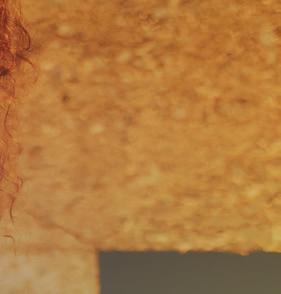

Location: Franklin, MA
Majors: D, MT, T, O dean.edu/academics/schools/ school-of-the-arts
Dean College is a private residential college located just outside of Boston, in Franklin, MA, with unique programs geared to individual learning styles. Students can choose from programs in the School of the Arts, the School of Business, the Joan Phelps Palladino School of Dance and the School of Liberal Arts. A degree in theatre or arts and entertainment management from Dean College opens the door to a world of possibilities.
Learn More »
Location: Philadelphia, PA
Majors: A, D, FD, F, G, M, P, T, V, O drexel.edu/westphal
Drexel University's Antoinette Westphal College of Media Arts & Design offers 18 undergraduate majors, 26 undergraduate minors, and several STEM-designated and accelerated degree options housed in awardwinning facilities that encourage collaboration across creative disciplines in the fields of media, entertainment, design, and the visual and performing arts. Through experiential learning, studio-based curriculum, industryleading faculty, and Drexel’s widely recognized Cooperative Education program, students are prepared to contribute to, and lead in, the fastgrowing creative economy. Learn More »
Location: Gettysburg, PA
Majors: M, F, V, O gettysburg.edu/academicprograms/sundermanconservatory Gettysburg’s Sunderman Conservatory provides excellent musical training grounded in the liberal arts for students who seek to make music integral to their lives, whether as a career or a life-long avocation. Honoring our place as a dynamic conservatory within one of the nation’s leading liberal arts colleges, we foster rigorous study, creativity, intellectual curiosity, and joy in music. Learn More »
Location: Bryn Mawr, PA
Majors: FD, G, V, O harcum.edu
Harcum is an associate’s degreegranting independent residential college located near Philadelphia offering career-ready programs in fashion design, fashion merchandising, graphic design, and interior design—all housed in our picturesque, awardwinning Art & Design Center. Take your creativity to the next level. Learn More »
Location: Bloomington, IN
Majors: A, FD, G, P, V, O eskenazi.indiana.edu
Eskenazi School is where artists, designers, and merchandisers find their community and shape their skills with guidance from expert creatives. We offer degrees in Comprehensive Design, Fashion Design, Interior Design, Merchandising, and Studio Art, with options to explore ceramics, digital art, fibers, graphic design, metals, painting, photo, printmaking, and sculpture. Learn More »
Location: Ithaca, NY
Majors: D, M, MT, T ithaca.edu/academics/schoolmusic-theatre-and-dance
A: Architecture, D: Dance,
FD: Fashion Design, F: Film,
G: Graphic Design, M: Music,
MT: Musical Theatre,
P: Photography, T: Theatre,
V: Visual/Fine Arts, O: Other
A natural habitat for trailblazers and difference-makers, the Ithaca College School of Music, Theatre, and Dance empowers emerging artists to be agents of positive change. As a comprehensive college that offers both liberal arts and professional degree programs, Ithaca College offers an exceptionally broad array of possibilities for Music, Theatre and Dance students. Study various aspects of composition, production, stage management, and performance in music, theatre, and dance. Learn More »
A: Architecture, D: Dance, FD: Fashion Design, F: Film, G: Graphic Design, M: Music, MT: Musical Theatre, P: Photography, T: Theatre, V: Visual/Fine Arts, O: Other
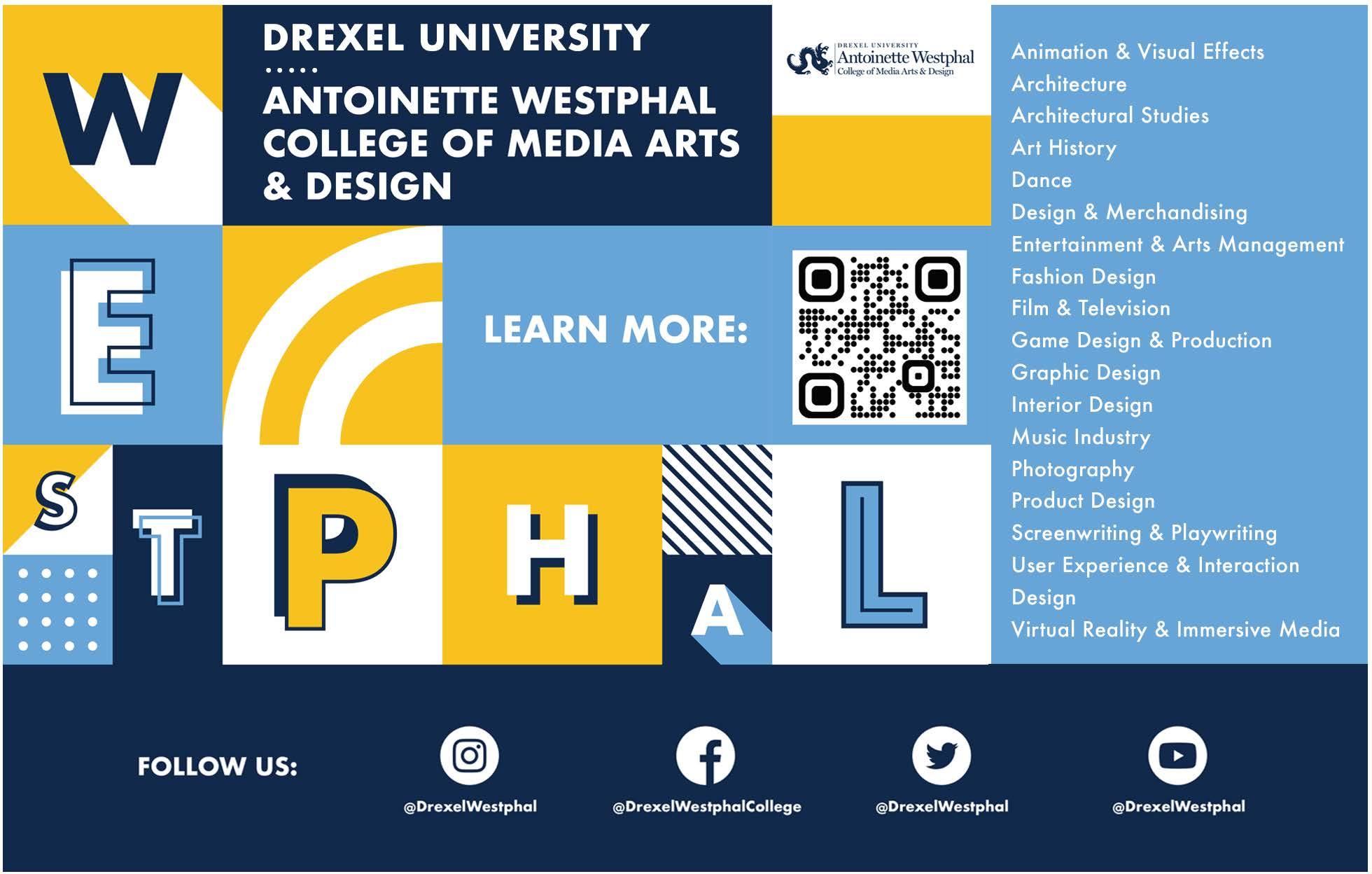

Bring your talent to the premier progressive hub for the performing arts at the Ithaca College School of Music, Theatre, and Dance.
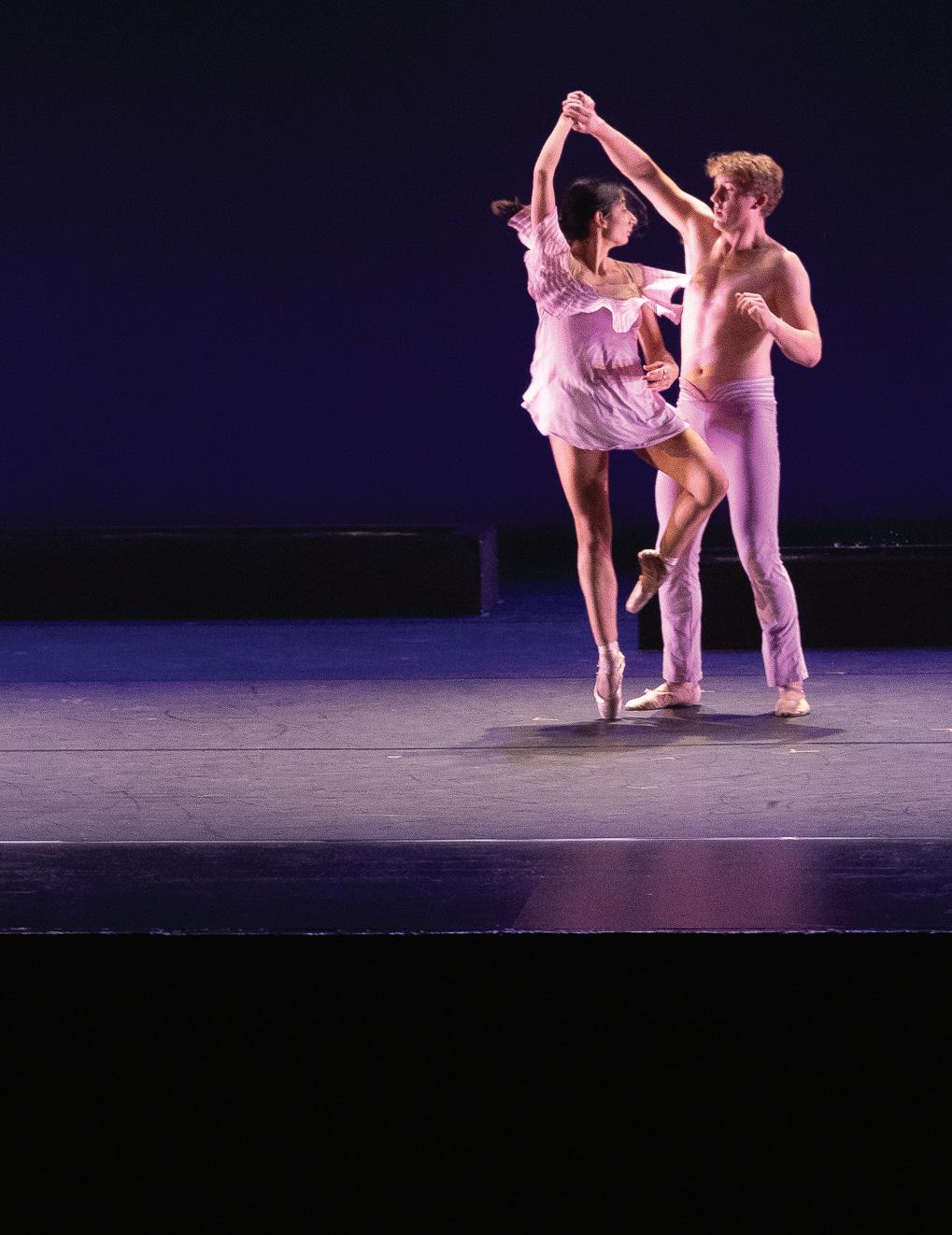
AUDITION AND INTERVIEW DATES
Theatre and Dance
December 2, 2023
January 26–28, 2024 (NYC)*
February 3, 2024
February 5–8, 2024 (Chicago)*
February 10, 2024 (Los Angeles)*
February 17, 2024
February 24, 2024
APPLICATION DEADLINES
December 1, 2023
Drum Set, Voice, B.M. Sound Recording Technology, Acting, Musical Theatre

February 1, 2024
All Other Music Majors and NonPerformance Theatre Majors
Location: Norwich, U.K.
Majors: F, G, V, O nua.ac.uk
Norwich University of the Arts (NUA) is a leading UK university offering three year undergraduate and one year graduate programmes in art, design and media disciplines. For over 170 years NUA has offered specialist studio-based, practice-led learning that prepares graduates for success in the creative industries. Learn More »
Music
December 9, 2023
January 27, 2024
February 3, 2024 (Virtual)
February 17, 2024
ithaca.edu/mtd/apply mtd@ithaca.edu
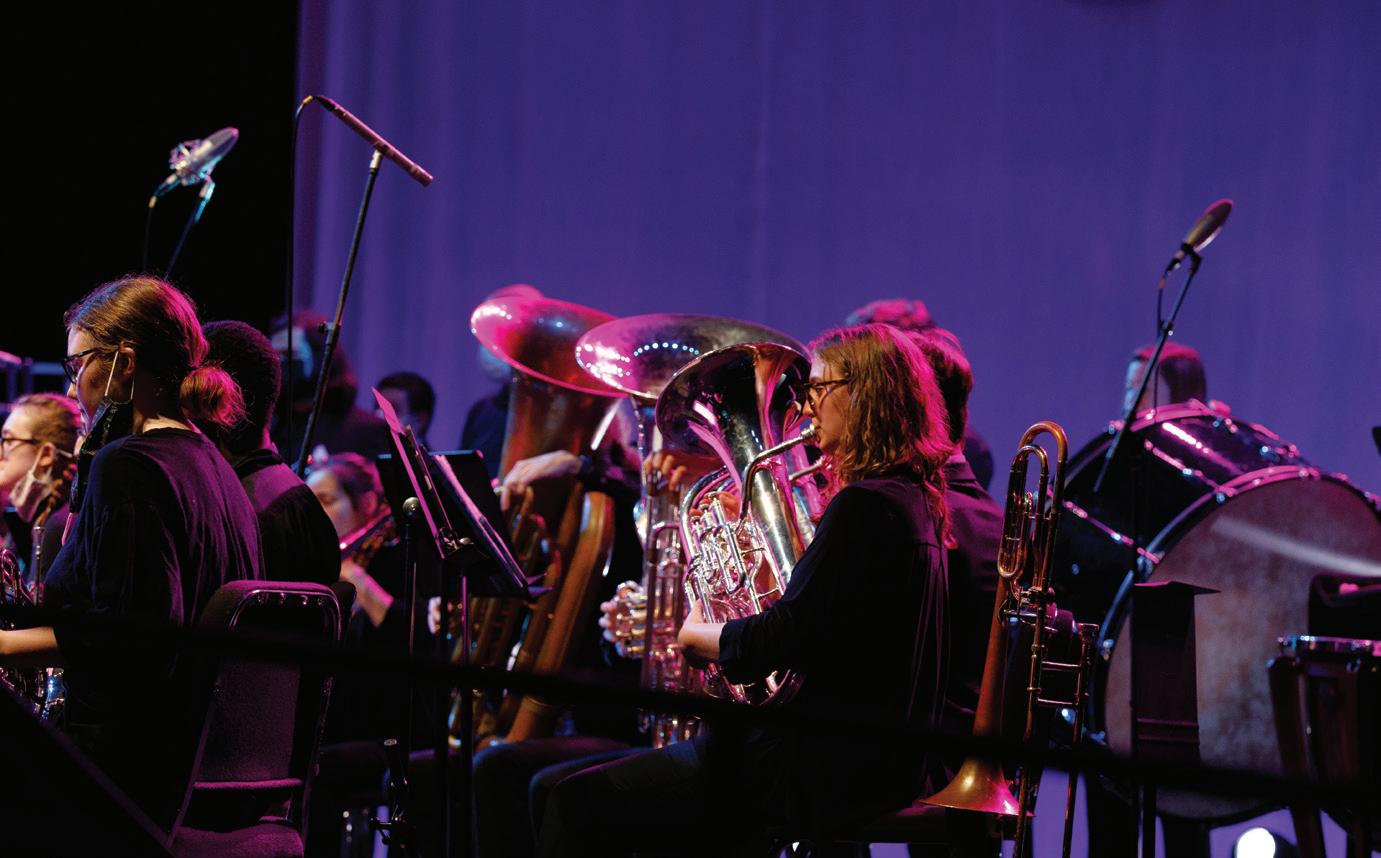
Location: Elsah, IL
Majors: D, F, M, MT, P, T, V principiacollege.edu
At Principia you will study and learn with professionals, connect with a vibrant community that encourages your expression, and bring your creative dreams to life. We offer studio and performing artists an inspiring perch and state of the art facilities from which to develop and realize your vision. Our 2,600-acre campus on the bluffs of the Mississippi is home to 31 majors and minors, 16 NCAA Division III athletic teams, multiple study abroad programs, and many student clubs and organizations. Learn More »
Location: Sarasota, FL
Majors: F, G, P, V, O ringling.edu
Since 1931, Ringling College of Art and Design has cultivated the creative spirit in students from around the globe. The private, notfor-profit, fully accredited college offers the BFA degree in eleven disciplines and the BA degree in two. The College employs the studio model of teaching and engages students through a comprehensive program specific to the major of study and focused on the liberal arts. Ringling College’s teaching model shapes students into highly employable and globally aware artists and designers. Learn More »
Location: Chicago, IL
Majors: A, FD, F, G, P, V, O saic.edu/admissions/ undergraduate
The School of the Art Institute of Chicago, the nation's most influential art and design school, offers a unique interdisciplinary curriculum designed to provide students with unparalleled opportunities to develop their creative and critical abilities. Here, you don't declare a major and are free to explore and create across our 17 studio and academic departments, so you can customize your education and combine a wide range of media to fulfill your artistic vision. Learn More »
Location: Greensburg, PA
Majors: D, G, M, MT, T, V setonhill.edu/academics/ schools/visual-performingarts
Creative, innovative, imaginative -this is what it means to be a Seton Hill University student!
Seton Hill has a passion for the arts. It is reflected in the work of students and faculty who thrive as a community of artists, musicians, performers, therapists and educators. Learn More »
Location: DeLand, FL
Majors: MT, T stetson.edu/other/academics/ undergraduate/theatrearts.php
Stetson University's focus on the practice strikes a balance between study and application, between academic and professional opportunities and between performance and technology — with all students collaborating on an equal footing, whether as actors, technicians, designers and directors. Your learning experience will be enhanced by one-on-one faculty mentoring, as well as the development of relationships with outside arts organizations. Learn More »
Location: Syracuse, NY
Majors: FD, F, G, M, MT, P, T, V, O vpa.syr.edu
The College of Visual and Performing Arts (VPA) at Syracuse University is committed to the education of cultural leaders who will engage and inspire audiences through performance, visual art, design, scholarship, and commentary. Unleash your powers of expression at VPA! Learn More »
Location: Nashville, TN
Majors: M, MT, O
theblackbirdacademy.com

Learn Live Sound and Studio
Engineering on the best gear, from top engineers, producers, recording artists and educators at our Professional School of Audio. The Blackbird Academy's campus is built on the foundation of the Blackbird Studio in Nashville, Tennessee, a multi-studio production facility where award-winning records are made every day. Learn More »
Location: New York, NY
Majors: D, F, M, MT, T, O nycda.edu
We offer Film and Television Performance, Musical Theatre Performance, Theatre Performance and New Media for Actors - all are two-year Associate Degree Training Programs. We also offer four-week Summer Intensive Training Programs. Our faculty are professionals currently working in the industry. Students work towards the experience of performing in a professionally produced on-camera scene, or in a performance on a New York City stage, and graduate with the tools to get work including a resume and network of industry contacts. Learn More »
Location: London, UK
Majors: MT, T, V cssd.ac.uk/undergraduate-courses
Located in the heart of London, The Royal Central School of Speech and Drama has been developing talented creatives for over 100 years. From Oscar-winning actors to Tony Award-winning Sound Designers, every area of performance and production is covered by our courses. Learn More »
Location: Tucson, AZ
Majors: D, F, G, M, MT, P, T, V cfa.arizona.edu
The College of Fine Arts at the University of Arizona has a worldclass reputation. The University of Arizona CFA offers undergraduate and graduate degree programs through the School of Art, School of Dance, School of Music, and the School of Theatre, Film and Television. Learn More »
Location: Denver, CO
Majors: A, F, G, M, P, V artsandmedia.ucdenver.edu
The College of Arts & Media at CU Denver knows that talented creators and innovators deserve careers doing what they love. CAM leverages the real-world experience of acclaimed (and connected) faculty and the location of the college— in the heart of Denver’s thriving artistic, creative, and entertainment industry. Learn More »
Location: Albuquerque, NM
Majors: D, F, G, M, P, V, O finearts.unm.edu
UNM College of Fine Arts offers a variety of degrees in Visual and Performing Arts. Areas of study: Studio Art, Art History, Art Education, Photography, Interdisciplinary Arts, Film Production, Video Game Design, Animation, Music, Conducting, Jazz, Music Education, Performance, Dance, Design & Technology for Performance, Dramatic Writing, and Theatre. Learn More »
Location: Winston-Salem, NC
Majors: D, F, M, MT, T, V, O uncsa.edu
UNCSA boasts five standalone arts conservatories — Dance, Design & Production, Drama, Filmmaking and Music — where individual artistry and creative collaboration collide. Students live, work and play with artists across conservatories and collaborate in classes, on personal projects and on the UNCSA performance season. Programs are available at the high school, undergraduate and graduate levels — and students of all ages and skill sets often share the learning environment in ways that enrich the experience for everyone. Learn More »
Location: Philadelphia, PA
Majors: D, F, G, M, MT, P, T, V, O uarts.edu
University of the Arts’ mission is simple: to advance human creativity. UArts offers 23 programs in design, fine arts, film, music, dance, theater and writing taught by working artists, and fosters collaboration across disciplines through 20 minors that are open to all students, regardless of their majors. Learn More »
Location: Raleigh, NC
Majors: MT, T, V, D, M, O peace.edu
Build a degree as unique as you. At WPU, you can major or minor in Interdisciplinary Arts (IDA) to build a degree that fits you. core interdisciplinary arts courses and electives spanning the visual and performing arts. In this electives section, students customize their degree to their specific interests, such as ART, DANCE, FILM, GAME DESIGN, MEDIA, MUSIC, and THEATRE. Learn More »
Location: North York, ON, Canada
Majors: D, F ,G, M, T, V, O ampd.yorku.ca
AMPD prepares students for creative industry and professional opportunities in Canada, the US, and around the world. With lower tuition costs than most US out-ofstate fees, AMPD offers competitive programs in a diverse city with a vibrant art and culture scene.
Learn More »
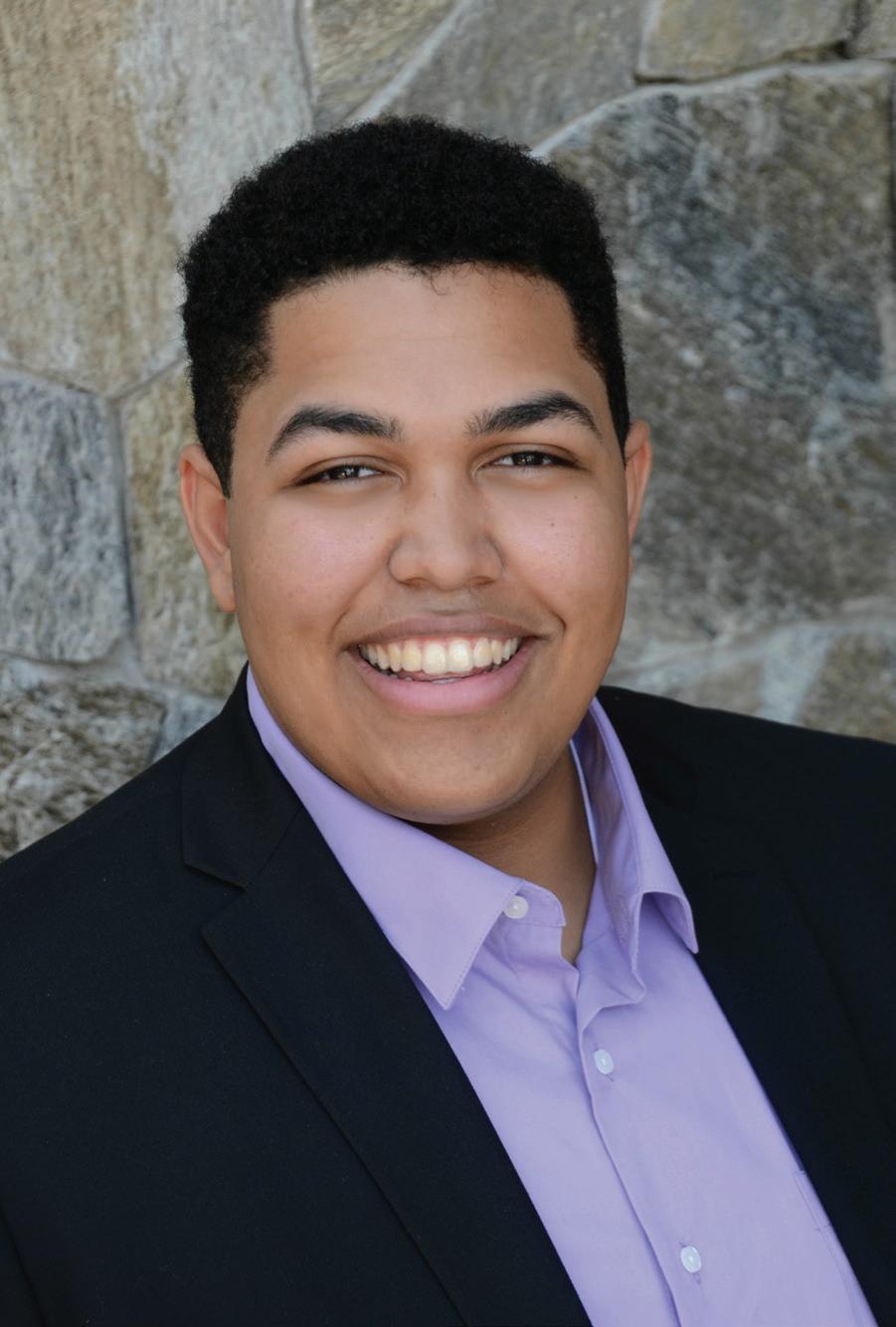
The second I auditioned at Dean they made me feel as if I was already a part of the community. They quickly found a way to make Dean feel like home. The Theater program was full of people ready and eager to accept me and that was the reason I had to enroll at Dean.
I wanted a program that would allow me to grow as an artist and I loved the idea of becoming a triple
threat. I wanted to grow as a writer, I wanted to improve my directing skills, and I wanted to learn what it was like to produce my own show. Dean allowed me to do that. I’ve been able to produce, write, and direct on multiple occasions throughout my time here at Dean. It was the perfect program for me.
Oh boy did I! Preparing for Musical Theater is a lot! But when you love what you are doing, it’s all part of a bigger goal. It’s voice lessons, acting classes, dance classes, and music theory, As well as workshopping your resume, improving your networking, discovering your type and figuring out just what you are good at. Not to mention getting material ready for the auditions themselves! Years and years of training just to get seen.
My typical day is busy. It’s full of classes; dance class, voice lessons, acting classes etc. When I’m doing a show, my day is even crazier, usually 9 am - 10 pm. While I’m going nonstop, I always try to find an hour for myself for a quick nap or a bite to eat.
College is one giant “you had to be there” moment, but the summary of my junior year at Dean College was that every semester was filled with growth, love, and excitement! Dean always created moments worth reliving - too many to talk about!
Pick the place where people gravitate towards you. When you step on that campus do people make you feel invited? That's a huge aspect; yes, classes and feeling challenged are important, but the people are what make your college experience. For me the people have made my Dean experience and they quickly set themselves apart and made me feel as if I was already a part of something.

f you're a high school student with a passion for the arts, applying to a performing arts college can be both thrilling and nerve-wracking. One of the most crucial aspects of the application process is the audition. Your audition is your chance to showcase your talents, personality, and potential to the admissions committee. To help you prepare for and excel in your audition, here are some top tips that will set you on the path to success.
BY NANCY LIPreparation is key. Begin working on your audition pieces well in advance to give yourself ample time to practice and refine your performance. Each performing arts college may have specific requirements, so make sure to read through the audition guidelines and follow them meticulously.
Select pieces that truly highlight your strengths and versatility. Whether it's a monologue, a dance routine, a musical performance, or any other form of art, make sure your chosen material resonates with you and allows you to showcase your unique talents.
Admissions committees are looking for potential, so demonstrate your range and ability to adapt. If you're a singer, choose songs that showcase different vocal qualities. Dancers should consider incorporating various styles into their routine. A versatile performer stands out and shows that they're ready to take on challenges.
Rehearse your pieces thoroughly. Dedicate time every day to practice, refining your technique, and honing your performance. Record yourself and analyze the recordings to identify areas for improvement. Enlist the help of teachers, mentors, or peers for constructive feedback.
Strong technique is the foundation of any successful performance. Whether you're an actor, musician, dancer, or artist, focus on perfecting your technical skills. This not only impresses the admissions committee but also gives you the confidence to shine on audition day.
Additionally, It’s incredibly helpful to rehearse in what you plan to wear to your audition. Prepare to dress in a way that complements your performance and shows professionalism. Pay attention to details, from your outfit to your hair and makeup.
It's completely normal to feel nervous before an audition, but excessive anxiety can hinder your performance. Develop strategies to manage your nerves, such as deep breathing, visualization, or meditation.
Auditions might not always go as planned. Technical glitches, nerves, or unexpected circumstances can occur. Adaptability is a valuable trait in the performing arts. If something goes wrong, stay focused and continue to deliver a strong performance.
Many performing arts colleges include interviews as part of the audition process. Be ready to discuss your background, experiences, influences, and aspirations. This is an opportunity to share your passion and demonstrate your dedication to your craft.
Your individuality is your greatest asset. Don't try to imitate someone else's style or performance. Showcase who you are and what makes you unique. Authenticity is captivating and memorable.
An important thing to remember is that confidence is magnetic. Stand tall, make eye contact, and project your voice or movements with assurance. Believe in your abilities, and the panel will believe in you too.
Above all, let your genuine passion and love for the arts shine through. Admissions committees are not just looking for technical perfection; they want to see your enthusiasm, dedication, and potential to contribute to the performing arts community.
After your audition, you might receive feedback from the panel. Whether it's positive or includes areas for improvement, take it graciously. Constructive criticism can help you grow as a performer.
Rejections are a part of the journey, but they don't define your worth as an artist. Stay positive, keep refining your skills, and continue pursuing your passion. Remember that every audition is a chance to learn and improve.
Preparing for a performing arts college audition can be intense, but it's also an incredible opportunity to showcase your talent and commitment. Keep these tips in mind, stay dedicated to your craft, and believe in yourself. Your hard work and authentic passion will undoubtedly leave a lasting impression on the admissions committee. •
Use this index to find a school's ad or listing by location.

DEPARTMENT OF ART
Promotes an inclusive environment where creativity and critical discourse thrive.
DEPARTMENT OF FILM & DIGITAL ARTS
Develops the necessary skills to succeed as a moviemaker, screenwriter, video game designer, film historian, or experimental arts practitioner.
DEPARTMENT OF MUSIC
Encourages students to develop their skills as complete musicians.
DEPARTMENT OF THEATRE & DANCE
Cultivates critical thinking and analysis, providing a broad, liberal arts education in the related performing arts.
INTERDISCIPLINARY ARTS


Provides a customized degree plan with two or three areas of focus in multiple media and arts disciplines.
Learn more at
FINEARTS.UNM.EDU
